- Skip to primary navigation
- Skip to main content
- Skip to primary sidebar
- Skip to footer

Dog's Best Life
The information you need to keep your dog happy, healthy, playful and loyal.

9 tips to make your dog’s first vet visit successful
PUBLISHED: June 6, 2022 | UPDATED: October 6, 2023

You are the most critical person in your dog’s life; there’s no doubt. But there’s also another person that your pet will need, their veterinarian. Veterinarians do their best to keep animals healthy and care for them when they get sick.
To stay healthy, dogs require regular exercise, proper nutrition, and, most importantly, consistent medical care. Animal doctors can assist you with all these three critical components so your pet can live a healthy lifestyle.
Although many dogs are scared when visiting their vet , it doesn’t necessarily mean it’s a bad experience. Going to the veterinarian is a must, especially if you have a new puppy. And it’s your job to help your puppy adjust and have a positive experience every time you visit their vet.
Keep reading to learn nine tips to prepare for your dog’s first vet visit.
Don’t delay your dog’s first vet visit
Even though your new pup may look healthy from the outside, you’ll never know how he feels from the inside unless you have him checked by a veterinarian. You must get your dog examined as soon as possible after buying him or bringing him home from a shelter.
The vet can detect medical issues that are not apparent at first. Also, scheduling the first visit can help establish rapport with the veterinarian. This is important, especially when your dog gets sick or has an emergency , to receive immediate care.
Find the right veterinarian
Finding the right veterinarian will be essential for keeping your pet healthy. They are as important as the pet owner. Your dog will see the vet throughout many stages of their lives , so it is crucial to find someone who will treat them with compassion and understanding.
To find the right veterinarian, you can ask for referrals from friends, neighbors, and family members. Word-of-mouth is often more reliable than online reviews, so seeking referrals is always good. Speaking with local people about veterinary services in your area will give you an idea of what others say about the clinic.
Schedule an appointment
After finding the right veterinarian for your puppy, it’s time to make that call to schedule an appointment.
It’s best to schedule your vet visit in the morning when delays are less likely, and there are fewer people. This is especially true if your dog hasn’t completed his vaccinations yet because he’s still susceptible to diseases. For that reason, you should also be consistent in keeping up with your puppy’s vaccination schedules in the long run.
Scheduling the appointment when there are fewer people can also help ease the anxiety that your pet may feel since it’s their first time in a vet clinic. You may also want to go to the clinic ahead of time to avoid traffic and help get your pet settled in, as you may be required to fill out some paperwork.
Prepare for your first vet visit
As you schedule an appointment at a vet clinic, a receptionist or the veterinarian will tell you to bring a couple of items on your first vet visit. Usually, vets require you to bring a copy of your pet’s medical records and all paperwork from the breeder, shelter, store, or rescue organization. Also, don’t forget to bring any medications that your puppy takes.
Furthermore, vet clinics will require you to fill out a new patient information form upon arrival. If the clinic offers patient forms online like Sunnyside Veterinary Clinic does, that’s even better. Just be sure to fill them out first before heading to the clinic so your visit will go even more smoothly. A stool sample may also be required to test your puppy for intestinal parasites. So, don’t forget to collect a sample ahead of time and label it with your puppy’s name, your name, and date.
Don’t forget to prepare for the trip to the clinic so that your first vet visit will be a positive experience for you and your dog.
Help your pet adjust
Presumably, you and your puppy will be riding a car on your way to his first vet visit. You need to make sure that your pet dog is comfortable throughout the whole trip. You don’t want your dog to feel uncomfortable or throw up before reaching the clinic. This is why you must get your pet acclimated to the carrier.
You can have trials at home where you put your dog inside a pet carrier for a couple of minutes so he can get used to it. This way, he won’t feel uncomfortable on the way to the vet clinic.
Additionally, you may want to consider learning the proper placement of the pet carrier once inside a vehicle. Place the crate on the backseat floor for maximum stability. This way, your puppy won’t feel dizzy and throw up while on the road. Avoid placing the carrier on any seat as it may fall off. Lastly, don’t forget to check your pet for any signs of distress during the car ride.
Be a good example

One of the reasons dogs, especially pups, get uncomfortable when visiting a vet is because they sense their owner’s emotions. So, if you get nervous or show any signs of anxiety, your dog may also become anxious.
To prevent this from happening, you need to set a good example for yourself and try to relax. Treat it as a typical outing for you and your puppy. Upon arrival, greet the clinic staff cheerfully, and avoid spending too much time reassuring your dog. This way, you’ll both have a positive first vet appointment experience.
Socialize your dog
Many dogs tend to get anxious, weary, or nervous during their first vet visit because they are uncomfortable around new people. Some dogs struggle in a situation when people they don’t know handle them. Some may even show aggressive behavior as their defense mechanism against being surrounded by strangers.
Even if you don’t believe that your dog will behave this way, you’d be surprised to see how much his behavior changes when put in a stressful situation. To prevent this from happening, socialize with your dog early on as preparation for the scheduled appointment.
Try introducing him to new people and different kinds of situations. This way, he’ll learn to trust strangers and is less likely to show aggressive behavior when taking him to the vet. Establishing a mentality that vet visits are not scary during the first appointment will make your subsequent visits smoother and more pleasant for you and your pet.
Know what to expect
It can be helpful if you know what to expect during your dog’s first vet visit. Usually, a veterinarian will perform the following procedures on your puppy:
- Physical exam.
- Series of vaccines.
- If you didn’t bring a stool sample, the vet might try to obtain one.
- Flea treatment .
You should expect some fees when going to the vet. The overall cost of the appointment will depend on the procedures, your dog’s medical history, and your geographical location. On average, the fee ranges from $150 and above. Some clinics offer coupons or waivers for first-time patients, so take advantage of them.
Prepare for questions from the vet
The vet will ask a couple of questions regarding your dog. The first thing that they usually ask is how things are going so far with your new puppy. Be sure to express any concern, especially when you notice anything alarming or unusual with your pet. Typically, the vet may change his approach with the checkup depending on your answer. But if everything’s fine, the vet will ask a couple more questions about his eating habits, behavior, and other health-related issues .
This brief question and answer portion can also be your opportunity to ask for any advice on any eating, behavioral, or health problems that you’ve experienced so far. You can also ask the vet about any potential problems or concerns that you have. Prepare a list of questions so you remember everything and make the most of this opportunity.
Bottomline for a successful first vet visit
Veterinary visits, especially the first one, are essential for preventing and treating various conditions and diseases. Taking your dog to the veterinarian is critical for your dog’s health.
These vet visits will allow the veterinarian to pick up on any subtle changes in your dog’s health. Your vet will also understand your dog’s overall health and be able to give you tips on how to keep your pet happy and healthy.
Related Posts

Vet visit fear: Modify the negative association by making vet…

Routine vet checkup benefits include monitoring and protecting your dog's…

The Vets offers convenience by providing annual wellness exams, vaccines,…

Veterinary specialists train for three to five years. You can…
Quick Links
- Top Stories
Recent Posts
- Is a smart, loyal, hard-working wolf dog your dream dog? Wolf-dog breeds like Siberian Huskies and Alaskan Malamutes are loyal, smart companions that make ideal family dogs. […]
- 21 essential upgrades to give your dog the best life at home Make simple home improvements for your dog: Upgrade flooring, secure outdoor space, improve air quality, and incorporate technology. […]
- Is a hard-working, curious Schipperke your dream dog? The Schipperke is a small but hard-working breed with a fox-like face, stocky body, and pointed ears. Their coats are solid black. […]
- Boost your dog’s sleep: 7 reasons to use a blanket year-round Young, old, sick, and small dogs all benefit from using a dog blanket. Blankets also protect your furniture and are easy to take on trips. […]
Get Our Newsletter
Get more news to help keep your dog healthy delivered right to your inbox. Sign up for DogsBestLife.com's monthly newsletter.
Email address:
By entering your information, you agree to allow us to contact you in accordance with our privacy policy.
You can see how this popup was set up in our step-by-step guide: https://wppopupmaker.com/guides/auto-opening-announcement-popups/
The Original GFP Puppy Finder
Use the options below to find your perfect canine companion!
Home » Blog » 11 Questions to Ask at Your First Vet Visit
11 Questions to Ask at Your First Vet Visit
If you recently brought a new dog home, you should have a vet visit scheduled. If this is your first time at a veterinarian, you might not know where to start. It can be an anxious time for you and your dog, but it is an important step in starting off on the right foot. Here are a few questions to ask at your first vet visit:
1. What Vaccines Does My Dog Need?
Scheduling a vet visit early on is something you need to know about the first six months with your puppy . Vaccinations are a very important part of your dog’s health and are often done at different stages of development. Your vet will determine which ones they need based on which ones they already have, your dog’s surroundings, and their age and health risks.
Your vet may ask about where your dog will go, such as the dog park, doggie daycare , or if you will need to board them at any point. If you have any questions about why they are suggesting certain vaccines or excluding some, don’t be afraid to ask!
2. What Items Are Dangerous to My Dog?
Certain plants, harmful foods , and household cleaners can be dangerous to your dog. It’s important to be aware of these items so you can keep them out of reach of your dog. Your vet will be able to answer all your questions and set your mind at ease.
However, there are plenty of fruits and veggies that are healthy for your dog. Adding these fruits and veggies to their diet is a great source of fiber and nutrients. Introducing these foods as “treats” is a great way to reward your dog in a healthy way.
If you forget something, you can always email or call your vet. It’s also helpful to keep the Pet Poison Helpline in mind if you need an answer ASAP.
3. Is My Dog Healthy?
Your vet is there to determine the health of your dog and to help you keep them healthy. Determining the health of your dog at their first visit gives you a good starting point. Your vet will look for signs that your puppy is healthy and for anything that could be a cause for concern.
They’ll most likely evaluate your dog’s skin condition, as well as respiratory and gastrointestinal health. Even dogs that present as healthy may be carrying parasites or have an underlying disease. They may run blood tests or a urinalysis. Getting any issues under control as early as possible can help get your dog off to the best start.
4. How Much and What Food Should I Feed My Dog?
How often to feed a puppy will depend on your specific puppy. Puppies often require a specific type of diet to give them the right nutrients, protein, and fat at a young age. Doing so can help avoid excessive weight gain, skin problems, as well as other issues.
Your vet can recommend a good diet to follow to help your puppy grow healthy and strong. They can also help you determine how much food your dog needs and when to increase or change their diet.
If your dog is older, your vet can recommend the right diet for whatever age range they are in as well as their activity level. The right nutrition is important for every dog so talking things over with your vet is a great place to start when it comes to choosing the best dog food for your dog .
5. When Should They Be Spayed or Neutered?
This is one of the common questions dog owners ask vets and should be one you ask in your first vet visit. Spaying and neutering are important aspects of your dog’s care. Unless you plan on responsibly breeding your dog, this should be performed at around age six months to one year. Of course, your vet will evaluate your dog and decide on the right time. Weight and health conditions typically factor into deciding what age is safest for your dog.
6. How Much Exercise Does My Dog Need?
All dogs need exercise. However, certain breeds may require more or less than other dogs. Flat-faced dogs will require a minimal amount due to breathing issues, but there are safe ways to exercise flat-nosed dogs . Other larger breeds typically need a lot of exercise, but not all.
Your vet will be able to assess your dog and help you figure out how much exercise is adequate. Keep in mind that dogs need to be fully grown before participating in a lot of exercise. Doing otherwise before puppies finish growing and their bones fuse may cause harm to their skeletal structure.
There are a lot of ways to exercise with your dog . Hiking, running, swimming, and biking are just a few to try. It’s a great way for both of you to stay healthy, relieve stress, and have fun together!
7. Does My Dog Need Preventative Medication?
Heartworm , and other parasites, as well as ticks and fleas, are an unfortunate reality in a dog’s life. It’s important to begin preventative treatment early on in your dog’s life. Ask your vet for their recommendations and course of treatment to begin.
8. When Will My Dog Be Housebroken?
Each dog is different and housebreaking may vary for each dog. Your vet can help you put together a housebreaking training plan to begin with your new dog. Consistency is key when beginning housebreaking training and is one of the house training tips to help potty train your puppy .
In general, most dogs are housebroken by the age of six months. If you’re not seeing any progress by month four, talk to your vet or another training expert for tips and help. Potty training regression can also occur so be aware of the possibility. With consistent training, your puppy should get back on track.
9. How Do I Stop Barking at Night?
It’s not uncommon for new dogs or puppies to bark or howl in the middle of the night. Usually, this stops after a few nights in their new home. But if this behavior continues there are a few ways to keep your dog from barking at night .
Provide your puppy with soft blankets or a toy to keep in their crate overnight. Some puppies will still need to go to the bathroom in the middle of the night before they are fully housebroken. But if your dog is simply whining because they want to play, you need to ignore them so they learn to sleep through the night.
10. What Grooming Do I Need to Take Care of?
All dogs require some level of grooming. Certain breeds will require a significant amount of grooming while others are pretty low maintenance. You will need to determine the grooming level of a puppy so you know how to best care for your dog. However, each dog needs to be brushed a few times a week and you need to look after their nails, teeth, ears, and eyes.
It’s important that puppies get used to having their teeth brushed and nails clipped. Cutting your dog’s nails usually involves clippers or a grinder. These are relatively simple grooming procedures you can do at home but if necessary, you can set up grooming appointments with a professional.
11. What Training Professionals Do You Recommend?
All dogs require training. This helps ensure that your dog is well-behaved, listens to you, and is overall a good dog citizen. Ask your vet if they recommend any training professionals or classes in your area.
Socialization is really important for dogs so working with a trainer or going to puppy/dog training classes is a great way for them to get used to other people and other dogs. This extra socialization is just one of the benefits of puppy training classes .
These are just a few questions to ask at your first vet visit. Your vet is a vital part of your dog’s life and health. Choosing the right vet is an important decision but once you find the right one, they will help you and your pup begin your new life in the best way possible!
Having the right vet for you and your dog is only part of the equation. Preparing yourself and your dog for the visit ahead of time is also important. Knowing what questions you want to ask and making sure your dog is comfortable are tips for smoother vet visits that everyone can appreciate.

9 Essential Questions to Ask During Your First Vet Visit

Welcoming a new pet into your home is both thrilling and filled with new duties. One of the foundational steps for any pet owner is the first veterinary visit, which sets the stage for a healthy life. Knowing what questions to ask during this visit can ensure that your pet gets the best start possible. Here's a detailed guide on the essential questions to cover with your veterinarian.

Detailed Questions for Your First Vet Visit
What is the ideal vaccination schedule?
- Vaccinations protect against diseases like rabies, distemper, and parvovirus. Each pet, depending on their species, breed, and age, might require a different vaccination timeline. Ask your vet to detail a personalized vaccination schedule for your pet.
What parasite prevention is needed?
- Parasites can affect your pet's quality of life and health significantly. Discuss options for prevention, including oral medications, topical applications, and environmental treatments, tailored to your area's common threats and your pet's lifestyle.
What diet do you recommend?
- Proper nutrition is crucial and varies by age, activity level, breed, and health condition. Inquire about specific brands, the benefits of wet vs. dry food, feeding frequency, and portions to prevent obesity.
How often should my pet have check-ups?
- Regular wellness exams help catch issues early. Based on your pet’s breed and health, your vet might suggest annual or bi-annual visits. It’s also a good chance to discuss routine screenings for heartworm, kidney function, and other potential issues.
Can you recommend a spay/neuter schedule?
- Spaying or neutering can prevent unwanted litters and certain health issues, including some cancers. The timing can impact your pet's growth and development, so it's important to get a recommendation tailored to your pet’s specific needs.
What are common health problems for this breed?
- Some breeds are prone to specific genetic conditions—like hip dysplasia in large dogs or respiratory issues in flat-faced cats. Understanding these risks helps you monitor your pet's health more effectively and take preventive measures.
How do I maintain my pet’s dental health?
- Dental disease can lead to serious systemic issues. Ask about daily brushing techniques , recommended toothpaste, special diets, or treats that promote dental health, and the frequency of professional cleanings.
What are the signs of illness I should watch for?
- Recognizing early signs of illness can save your pet’s life. Ask for specific symptoms such as changes in appetite, behavior, waste habits, or activity levels that should prompt a veterinary visit.
Are there any recommended pet insurance plans?
- Veterinary care costs can add up, especially if emergency care or surgery is needed. Discuss whether pet insurance is suitable for your situation, and ask for provider recommendations that other clients have had positive experiences with.
Your first vet visit is more than just a routine check it's a chance to equip yourself with the knowledge needed to provide the best care for your new family member. Armed with these detailed questions, you can establish a proactive approach to your pet’s health, ensuring they remain a happy and healthy part of your family for years to come. Remember, establishing a good relationship with your vet is key to managing your pet’s health effectively.
NEW ARTICLES

Why Regular Vet Visits Are Essential?

Why Does My Cat Have Dandruff?

Can Cats Eat Bugs?

7 Tips to take care of your Disabled Dog

Why Do Wet Dogs Smell So Bad?

Why is my Dog always Hungry?

Why Do Dogs Drool in the Car? 5 Ways to Prevent It

Snoring Pups: Why Your Dog Snores and When to Worry
- Choosing a selection results in a full page refresh.
Powered by Salepify App
Our Services
- Chat with a Vet Online
Sick Pet Care and Diagnostics
- Allergies and Dermatology
- Pet Pain Management
- Orthopedic Examination
- Neurological Examination
- Electrocardiogram (ECG)
- Pet Ultrasound
- Veterinary Diagnostic Imaging
Wellness and Preventative Care
- Wellness Exam
- Puppy and Kitten Wellness
- Nutritional Consultation
- Behavioral Consultation
- Vaccination
- Microchipping
Travel Certificates
- Domestic Travel Certificate
- International Travel Certificate
Surgical Procedures
End-of-life care.
- In-Home Pet Euthanasia
- Quality-of-Life Consultation
Our Locations
- Philadelphia
- Washington, D.C. Area
- Conejo Valley
- Greater Los Angeles
- Orange County
- San Francisco
- How It Works?
- Our Veterinarians
- Referral Program
- Write for Us
Pet Health Care Resources
- Pet Health Care
- Pet Nutrition
- Pet Symptoms
- Pet Conditions
- Pet Diseases
- Pet Medications
- Pet Lifestyle
Tools, Calculators & Calendars
- Pet Wellness Tools
- Pet Holidays and Awareness Days
Customer Support
- Help Center
- Code of Conduct

Puppy First Vet Visit: What You Can Expect
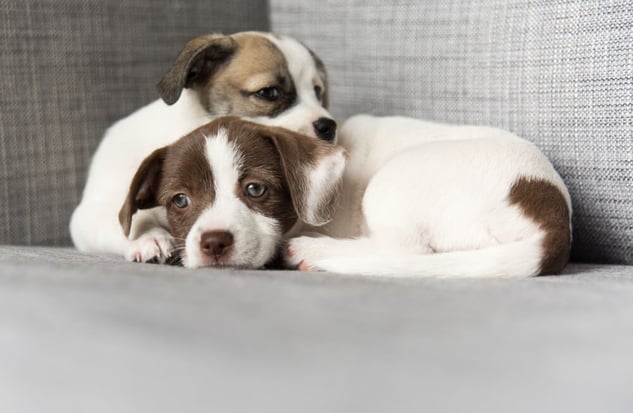
Table of Contents
Welcoming a new puppy is an exciting adventure, and we know keeping them healthy and happy is your main focus. Scheduling their very first vet visit is a top priority and being prepared for this appointment will give you peace of mind and lay the groundwork for their future well-being.
In this blog post, we'll walk you through what to expect during your puppy's first vet visit, giving you all the information you need to take great care of them from day one.
Key Takeaways:
- The first vet visit for your puppy is crucial for their overall health and well-being, including vaccinations, preventive treatments, and a comprehensive physical examination.
- Establishing a positive bond with the veterinarian during the first visit helps reduce stress for future visits and builds trust.
- It's crucial to schedule the visit early and be aware of signs that indicate a vet visit is needed.
Importance of Your Puppy's First Vet Visit
Early veterinary care for puppies is very important . Regular puppy checkups are essential for monitoring their growth, early detection of any potential health issues, and ensuring they receive necessary vaccinations and preventative treatments. By establishing a routine of regular vet visits, you can significantly contribute to your puppy's long-term health.
Moreover, the first vet visit is crucial in building a positive bond between your puppy and the veterinarian. It helps establish trust and familiarity, whether in the vet's office or the comfort of their home during a mobile vet visit , making future visits less stressful.
Stress-Free Wellness Exams for Your Growing Fur Baby
With our in-home visits, your kitten or puppy can snooze away while we keep their vaccines up-to-date and ensure they're on the right paw to a healthy and happy life.
What Happens During the Puppy Wellness Visit
During your puppy's first vet visit, several important procedures and examinations will typically take place. Here's what you can expect:
Comprehensive Physical Examination
The veterinarian will begin with a comprehensive physical examination to assess your puppy's overall health. This includes evaluating body condition, listening to their heart and lungs, examining their eyes, ears, and teeth, and feeling their abdomen for any abnormalities.
Vaccinations and preventive treatments
Puppy vaccinations and preventive treatments are other essential aspects of the visit. The vet will administer vaccinations to protect your puppy against common infectious diseases. They may also discuss and provide preventive treatments for parasites such as fleas, ticks, and heartworms . Deworming medications may be prescribed to eliminate intestinal parasites.
Health assessment and development tracking
Your vet will also conduct a thorough health assessment and track your puppy’s development. This includes monitoring weight, assessing growth milestones , and discussing behavior and trainin g , diet, or overall well-being concerns. They will provide valuable nutritional guidance and recommend a suitable diet to support your puppy's growth and specific needs.
How Big Will My Puppy Get?
Your puppy’s current age (in weeks), your puppy’s current weight (in pounds), view results, your puppy’s estimated weight in adulthood is pound/s, dental care.
Dental care is another essential component of the visit. The vet will offer advice on dental hygiene, including tooth brushing techniques and recommendations for dental treats or toys. Performing a dental examination to check for any signs of dental issues or abnormalities.
Microchipping and spaying/neutering
Additionally, the vet will discuss microchipping and spaying or neutering , providing guidance for your puppy's long-term health.
Addressing concerns and questions
Your puppy's first vet visit is an excellent opportunity to address any specific concerns or questions you may have as a new pet parent. The veterinarian will advise on training , socialization , behavior, or any other issues you wish to discuss.
Cost Considerations
The potential costs associated with the visit can vary based on geographical location and the specific services provided. It's a good idea to inquire about the fees associated with the visit beforehand, including the cost of the comprehensive physical examination, vaccinations, deworming, and any additional services or tests that may be recommended for your puppy's specific needs.
Some veterinary practices may offer pet wellness plans , which can help manage the costs of routine veterinary care by spreading them out over monthly payments. These plans often include services such as vaccinations, preventive treatments, and regular checkups. It may be worth discussing the availability and benefits of such plans with the veterinary practice.
When to Take a Puppy to the Vet
It's important to schedule your puppy's first vet visit within a few weeks of bringing them home, ideally around 6 to 8 weeks old . This early visit allows the vet to check their health and address any potential issues promptly.
Keep an eye out for signs that indicate it's time for a vet visit , such as persistent vomiting and diarrhea , loss of appetite , eye discharge , irregular urination, or changes in behavior. Trust your instincts and seek professional guidance when needed.
Related reading: How Often Should I Take My Dog to the Vet?
How to Prepare for Your Puppy Checkup
Preparing for your puppy's first vet visit is crucial to ensure a smooth experience. Here are some steps to help you get ready:
1. Gather important documents
Organize and compile any adoption or breeder paperwork, vaccination records, and medical history to provide the veterinarian with a comprehensive understanding of your puppy's background.
2. Note your questions and concerns
List any questions or concerns about your puppy's health, behavior, diet, or general care. This way, you won't forget to address anything during the appointment and can receive the necessary guidance.
3. Familiarize your puppy with car travel
To ensure your puppy's comfort, gradually introduce them to car travel . If needed, bring essential supplies like a leash, treats, and a carrier or crate. These items will help keep your puppy secure and comfortable during the visit.
What to Bring to the Appointment
To ensure a successful and organized first vet visit for your puppy, it's important to bring the following items:
Vaccination records or medical history
Bring any documentation regarding your puppy's vaccinations or previous medical history if available. This information will assist the veterinarian in understanding your puppy's health background.
Prescribed medications or supplements
If your puppy is currently taking any medications or supplements, be sure to bring them along. This will allow the veterinarian to review the prescribed treatments and provide appropriate guidance.
Fresh stool sample
Some veterinarians may request a fresh stool sample for testing. Check with your vet before the visit and, if requested, bring a small sample in a clean container. This helps identify any potential internal parasites or other issues.
Comfort items
Help your puppy feel secure during the visit by bringing along their favorite comfort items. This could include a familiar blanket, toy, or bedding that carries their scent. These items can provide reassurance and help reduce any anxiety they may experience.
Identification and contact information
Ensure you have proper identification for your puppy , such as a collar with a tag displaying your contact information. It's essential to have this information readily available in case of any unexpected situations during the visit.
Conclusion
Ensuring your puppy's health and well-being starts with their very first vet visit. By prioritizing this crucial step, you lay the foundation for a lifetime of health and happiness. Don't wait – Book a puppy wellness exam now and give your furry friend the best start in life.
Frequently Asked Questions
How long does the first vet appointment take .
The duration of the first vet appointment can vary, but typically it lasts around 30 minutes to an hour, allowing the vet to conduct a thorough examination and address any concerns or questions you may have.
Should I carry my puppy to the vet?
It is generally advised to carry your puppy to the vet for their safety and to ensure a stress-free journey. Using a carrier or holding them securely in your arms can help keep them comfortable and prevent any accidents during transportation.
Should I feed my dog before or after a vet visit?
You may wish to withhold food for a few hours prior to transport as it is not uncommon for puppies to experience motion sickness. The upside of a mobile veterinary visit is that no travel is needed and thus fasting is generally not necessary or recommended.
Should I bathe my dog before a vet appointment?
It is not necessary to bathe your dog before a vet appointment unless specifically instructed by your vet. However, ensuring your dog is clean and groomed can help with a thorough examination.
Should I get pet insurance before the first vet visit?
While it is not necessary to get pet insurance before the first vet visit, it is a wise decision to consider pet insurance or a pet wellness plan. Pet insurance can help cover unexpected medical expenses and provide financial protection in the long run, while wellness plans typically include the bundled preventative vet care services your puppy will need.

Written by Dr. Joshua Montgomery

Medically reviewed by Laura Fontana, DVM
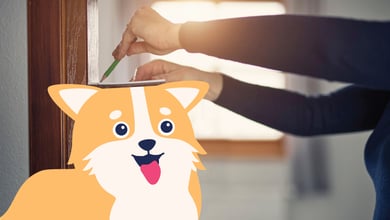
When Do Puppies Stop Growing?

Puppy Teething: Timeline and What to Expect
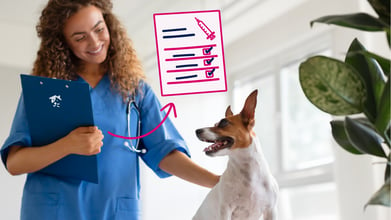
5-in-1 Vaccine for Puppies Schedule: Complete Guide
- Dog Health & Care
- Dog Nutrition
- Dog Training
- Vet Approved
Puppy’s First Vet Visit: Checklist & 15 Preparation Tips (Vet Approved)
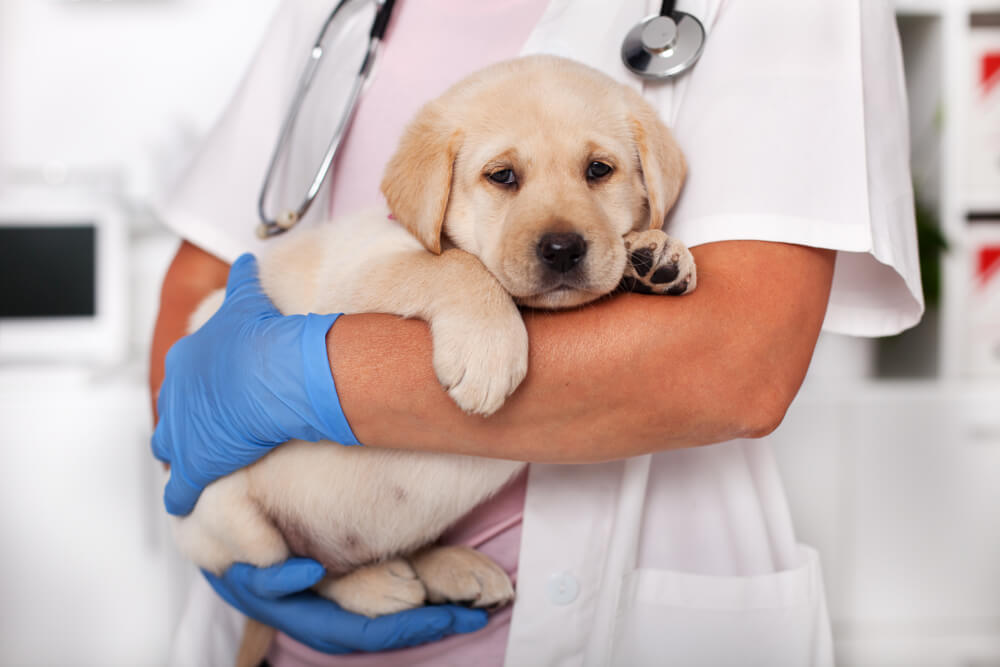
Image Credit: Ilike, Shutterstock
Last Updated on September 2, 2024 by Dogster Team
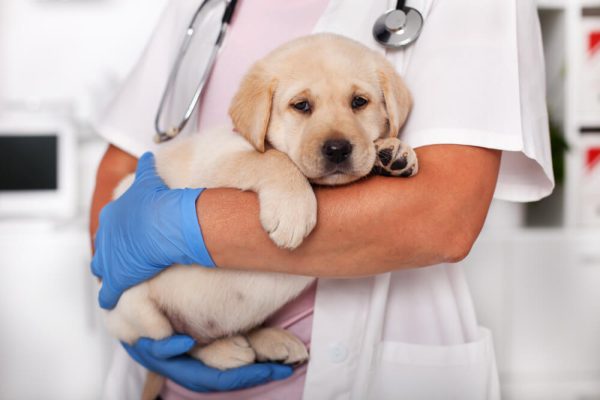
VET APPROVED
REVIEWED & FACT-CHECKED BY
Dr. Amanda Charles
BVSc MRCVS (Veterinarian)
The information is current and up-to-date in accordance with the latest veterinarian research.
Congratulations on your new puppy! While pet ownership requires a significant amount of time and effort, we are confident that you’ll find the experience rewarding. That said, veterinary care is an integral part of responsible pet ownership, and puppies aren’t unlike babies in terms of the number of checkups and vaccinations they need.
Introducing your pet to the vet while young will make it a positive experience and ensure that your pup is on the right course to have the optimal quality of life.
The things that you should do before, during, and after your puppy’s first visit include the following:
- Find a good and affordable veterinarian.
- Get pet insurance for your pet.
- Write down any questions or concerns you have.
- Have a copy of your pup’s medical history.
- Bring a copy of your pet’s health guarantee .
- Bring any forms required by your insurer.
- Pack some treats to create a positive experience.
- Get a leash and collar .
- Complete a new client form online if applicable.
- Set up your online account if applicable.
- Collect a fecal sample .
- Take your pup outside before entering the building.
- Arrive early or on time for your appointment.
- Verify the pup’s microchip ID if applicable.
- Set up a vaccination schedule and make your next appointment.

- The 15 Checklist and Preparation Tips for Your Puppy’s First Vet Visit
- 1. Find a Good and Affordable Veterinarian
Medium-sized dogs live about 10 to 13 years, with smaller breeds averaging more and larger ones a bit less. Suffice it to say that you’re going to have a long relationship with your pet’s veterinarian. Therefore, it makes sense to research your choice of a vet carefully. You can ask your family and friends for recommendations. Online reviews are another valuable source of information and guidance.

- 2. Get Pet Insurance for Your Pet
We recommend getting pet insurance for your puppy. Insurers have varying requirements for issuing policies, with many not covering pre-existing conditions. So, the sooner you get coverage, the better. Coverage also differs between companies, and many offer wellness protection add-ons that can help shoulder the cost of preventive care. Ensure that you understand the conditions and your obligations as the policyholder, though.
- 3. Write Down Any Questions or Concerns You Have
Make the best use of your one-on-one time with your vet by writing down any questions or concerns you have before your appointment. Veterinarians understand the anxiety that novice pet owners feel when they get their first puppy. No question is silly! It’s much better to get your answers from a professional than from Google.

- 4. Have a Copy of Your Pup’s Medical History
The seller should have had some veterinary care for your puppy. This likely included deworming and the first set of vaccinations. Bring a copy of any information the seller provides. Reputable breeders will also conduct health screenings on their animals, so have this information with you so your vet can note it on your pet’s chart.
- 5. Bring a Copy of Your Pet’s Health Guarantee
Many reputable breeders provide a health guarantee when selling their puppies. The agreement may also contain specific stipulations about your responsibility as a pet owner. We recommend bringing it for your vet to examine to ensure that you’re holding up your end of the bargain. Many documents may require sticking to a recommended vaccination and deworming schedule, for instance.
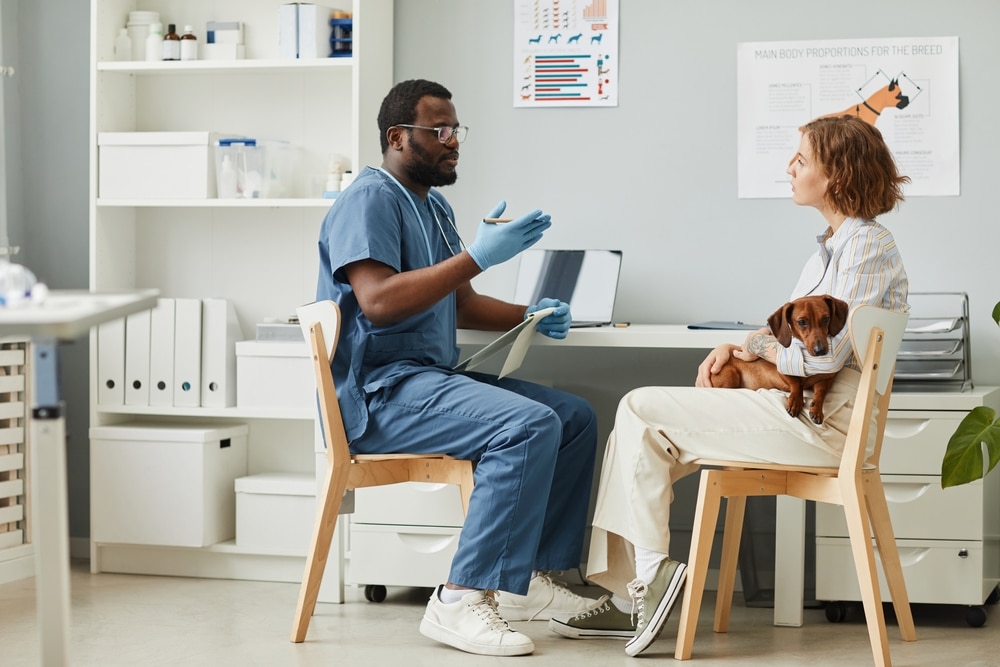
- 6. Bring Any Forms Required by Your Insurer
Your pet insurer may require specific forms for your vet to complete so you can submit claims. Trust us, it’s better to get them completed at the time of the appointment than trying to get them filled afterward. Some companies may have deadlines for you to submit these documents. We also suggest downloading the insurer’s app on your smartphone to save time, if one is available.
- 7. Pack Some Treats to Create a Positive Experience
Your puppy’s first vet visit will introduce your pet to many new experiences. Your job is to ensure they are positive. One of the best ways to foster this association is with treats. After all, canines are food-motivated. A yummy treat makes everything better, even after getting a shot. So, we recommend reserving them as training aids to increase their impact on your pup.
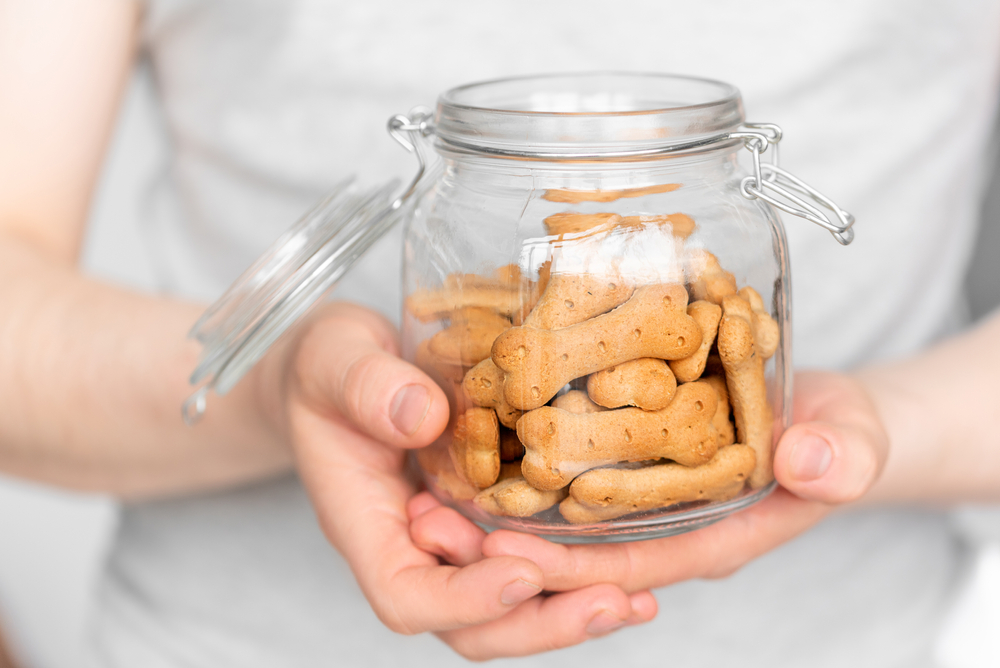
- 8. Get a Leash and Collar
Undoubtedly, your vet requires pets to be in carriers or on a leash. It is important to keep puppies as calm and comfortable as possible before and during their visit, so it’s best to get them used to new harnesses or collars beforehand. A familiar blanket and favorite toy to distract them while you wait for your appointment are also useful. The blanket can be placed on the table in the consultation room for your puppy to sit on. If your puppy is unvaccinated, make sure they don’t sit on the floor with the other dogs; if they’re not in a carrier, they will need to sit on your lap.
- 9. Complete a New Client Form Online If Applicable
Many veterinary clinics have forms available online to streamline getting new clients into their systems. We suggest checking for any necessary documentation and filling them out before your visit. The administrative staff will thank you for your efforts. Bring a hard copy of the completed forms in case of a computer glitch. It’ll give your vet a heads-up about your puppy.

- 10. Set Up Your Online Account If Applicable
You can also set up an online account with your vet if applicable. It’ll save time and allow your vet to devote their time to dealing with your puppy instead of having to read a paper copy to get up to speed. We suggest checking out the resources available online. Many clinics have informative websites that can answer many of your questions.
- 11. Collect a Fecal Sample
Most puppies are born with worms. They often inadvertently contract them from their mothers. The Companion Animal Parasite Council recommends deworming puppies every 2 weeks until the pup is 2 months old. Most vets request a fresh fecal sample from your puppy. You can put it in a resealable, disposable bag or a clean plastic container. Only a small piece is necessary; you won’t have to pick up the entire bowel movement.

- 12. Take Your Pup Outside Before Entering the Building
Puppies often urinate when they get excited. The first vet visit qualifies as that type of event. Do the clinic’s staff a favor, and if possible, take your puppy outside to void their bladder before entering the building. If you weren’t able to get a fecal sample, you may get a chance at this time, and the staff can provide you with a suitable container to pick it up.
- 13. Arrive Early or On Time for Your Appointment
We recommend arriving early or on time for your appointment. Be courteous of your vet and their time. They have other clients, and another pet owner may have a medical emergency. Make sure to check in with the reception desk when you enter the building. You can also give them the fecal sample so a tech can run it before you see the vet.
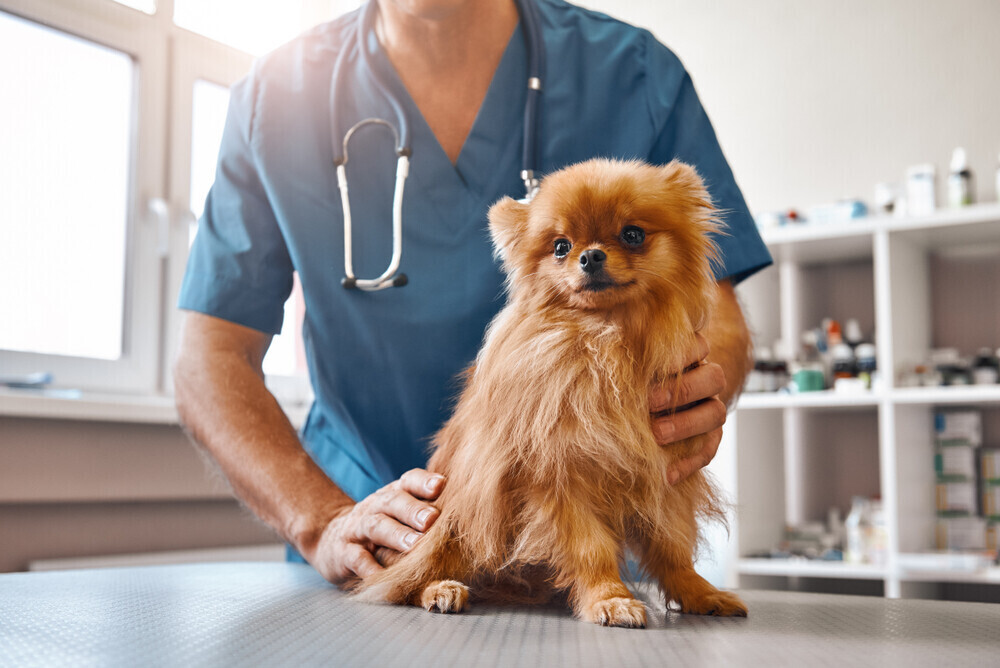
- 14. Verify the Pup’s Microchip ID If Applicable
Many sellers microchip their puppies before allowing them to go home. Shelters often require microchipping for adopted pets , so we suggest verifying the ID to ensure it’s the same as your documentation. Sadly, one study found that 41.9% of lost pets entering shelters lacked current identification information to reunite the animals with their owners.
- 15. Set Up a Vaccination Schedule and Make Your Next Appointment
You should set up a vaccination schedule for your puppy at that first visit. Your vet will recommend core vaccines. They may recommend others based on your lifestyle. For example, hunting dogs may require additional vaccines because of their risk of exposure. Remember that you must get your pup vaccinated against rabies legally in the U.S., and you may need proof for licensing, boarding, or travel.
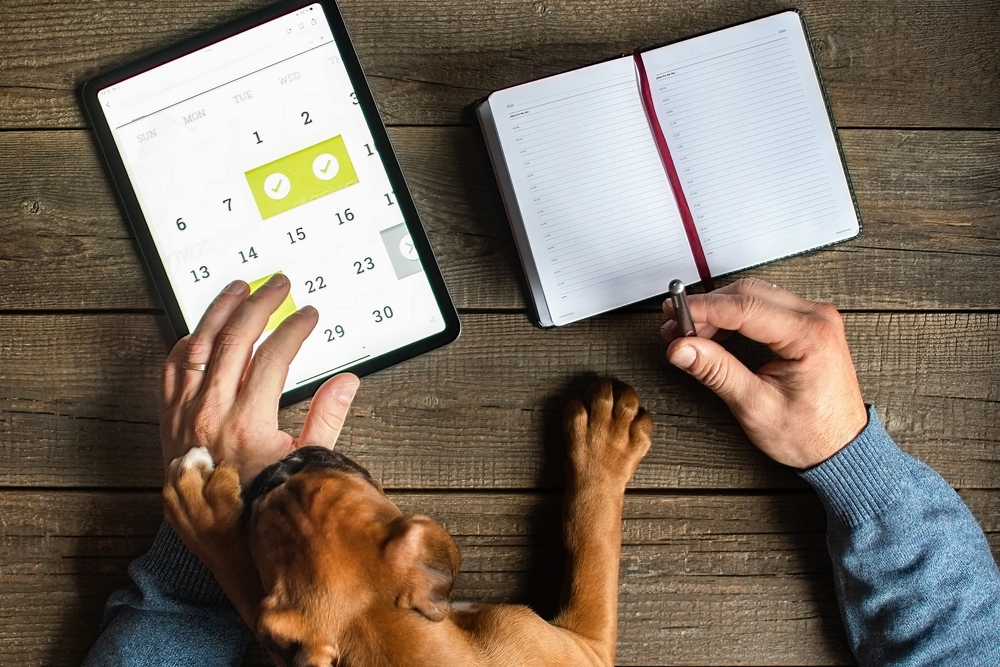
- Other Factors Involved With Your First Visit
The takeaway from your puppy’s first visit is creating a health maintenance plan. There are things that apply to all dogs, such as annual exams. These are necessary to keep your pup updated on vaccinations and routine testing. It’s also worth noting that preventive care can make veterinary care more affordable by avoiding the consequences of preventable health conditions.
Making the experience good is imperative. Sometimes, exams aren’t pleasant; they may be painful or uncomfortable. Nevertheless, it’s vital to make all aspects of the visits positive, including the car ride to the clinic.
- In Conclusion
Your puppy’s vet visit is an exciting time. It’s an opportunity for your pet to meet new friends, but it’s also an excellent chance for you to get questions answered and set your pup on the path to good health. Preparing for your appointment will optimize the time for you and your vet, and it ensures that everything runs smoothly and that your new pup doesn’t fear any upcoming visits.
- https://www.akc.org/expert-advice/health/how-long-do-dogs-live/
- https://www.aaha.org/aaha-guidelines/2022-aaha-canine-vaccination-guidelines/home/
Featured Photo Credit: Ilike, Shutterstock
How useful was this post?
Click on a star to rate (you can leave written feedback after clicking submit)
Help us improve Dogster for pet parents!
Your feedback really matters.
What did you like about this post? Also how can we improve it?
About the Author
Chris Dinesen Rogers
Since 2009, Chris has written on a variety of topics. Her motto with all of her writing is “science-based writing nurtured by education and critical thinking.” She specializes in scientific topics, with a special love for health and environmental topics, and of course, pets of all shapes and sizes. Chris lives happily with her husband and three cats in the land of 10,000 lakes, writing, wining, and boating as much as she can. She and her husband, Norm, were awarded the State of Kentucky Colonel Honor for their restoration work at Mammoth Cave National Park.

How to Protect Dog Paws in Winter: 10 Vet-Reviewed Tips & Tricks

High Cholesterol in Dogs: Our Vet Discusses Signs, Causes & Treatments
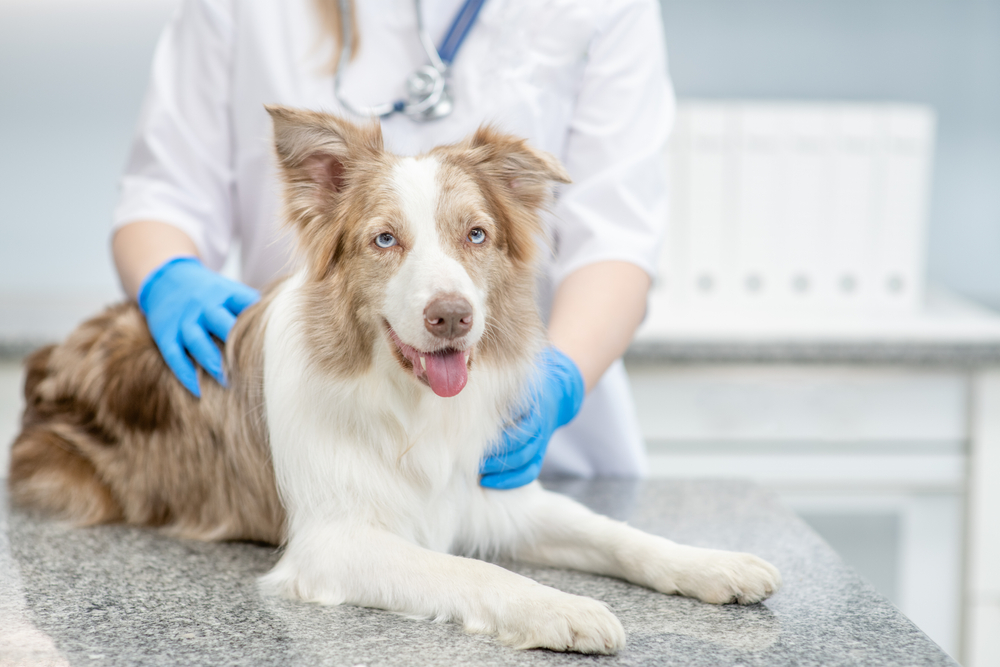
How Many Ribs Do Dogs Have? Vet-Approved Anatomy Facts & Info
Leave a reply cancel reply.
You’re very welcome to leave a comment or question. Please know that all comments must meet our community guidelines, and your email address will NOT be published. Let’s have a positive and constructive conversation.

Get Dogster in your inbox!

Cockeranian Mixed Dog Breed: Info, Pictures, Care, & Facts

German Shepherd Mastiff Mix Dog Breed: Info, Pictures, Care, & Facts

Corgi Bichon Mixed Dog Breed: Info, Pictures, Care, & Facts
© pangolia pte. ltd. all rights reserved..

7 Tips to Prepare for Your Pet’s First Vet Visit

The first visit to the vet can be nerve-wracking both for you and your pet. It’s only natural for them to be nervous. Your furry friend doesn’t understand the point of a veterinary visit. But you can ease this stress significantly by helping them prepare for that first vet visit. Taking care of your pet while they’re scared can become quite a task. Fortunately, we have six things you can do to get your pet ready and prepare for your first visit to the vet.
Are you concerned about your pet?
Book a video consultation with an experienced veterinarian within minutes.
- Professional vet advice online
- Low-cost video vet consultations
- Open 24 hours a day, 365 days a year
1. Help your pet adjust to the carrier
Presumably, you will be giving your pet a car ride to the vet. This means that they need to be comfortable on the way. You don’t want your cat to throw up before it even reaches the vet! It is necessary to get your pet acclimated to the pet carrier. Having trials at home can help. You can put your pet inside the carrier for a few minutes indoors to help them get used to it. That way, your pet will not be uncomfortable on the way to the vet visit.
Another thing you need to get the hang of is the placement of the pet carrier. For maximum stability, place the carrier securely on the floor of the backseat. Placing the carrier on the seat can risk tipping over or falling off. Don’t forget to keep a constant eye on your pet to check for signs of distress on the way!
2. Make a list of your pet’s unique behavioral patterns
Your pet very likely has specific unique behavioral patterns . It is often seen that pets exclusively communicate with their family or owners through body language . In such cases, it will be your duty to take note of these uniquely expressive behavioral patterns. They can signify aggression or anxiety. For instance, you would know best when and why your dog is feeling stressed or afraid. Also, these could be signs of distress from your pet. In any case, there are certain pet behaviors that you simply cannot ignore.
You should also make a list of any specific or chronic health conditions your pet has. This might be any skin disease, allergies, infections, etc.
Helping the veterinary team by passing on these behavioral and health signs can be a huge help. It will allow them to view your pet as a "known" patient, which means that their behavior and well-being become better understood by the veterinary team. It is a great way to ensure that your pet receives medical care sensitive to their behavior and needs. It also familiarizes the veterinary team with your pet's reception of strangers and medical care in general.
3. Use positive reinforcements during the drive and the vet visit
Much like you, your pet enjoys being praised! Gentle verbal reinforcements and affirmations can be a great way to ensure that your pet is at ease. It is extremely natural for pets to be high-strung and nervous when introduced to a new environment, where strangers handle them. That is why it is always a great prepping step to get the pet to listen to sounds or words that are otherwise calming to them. Instructions that they identify or comprehend can help them feel grounded.
4. Introduce your pet to being carefully handled
Making your pet feel comfortable at home is the best way to ease their fear of veterinarians. Having your dog remain calm while being handled will make everyone's lives easier. Examine your pet's teeth and run your fingers gently along his ribs once or twice a week to ease him into it. With increased familiarity, he is less likely to be stressed out when he sees the vet doing it as well.
5. Remain calm and collected during the visit
Animals can pick up on their owner’s feeling much better than fellow humans, and if you’re feeling anxious or stressed at the vet’s office, your dog or cat will notice. They’re like emotional sponges that soak up what humans feel around them and either mimic that behavior or become defensive in response. It can be a worry-inducing experience going to the vet, as you never know what you might learn, but you should try to stay calm and positive, so your pet will benefit too.
When you and your pet develop positive coping skills like those listed above, they will have a positive and safe experience at the veterinarian's office. Remember that taking your dog to the vet is not always a bad thing and that he may need some reassurance if he needs to go. Your dog will have a better attitude toward the vet if you prepare, tactfully and understand his needs.
6. Consider anti-anxiety treatments or medications if needed
When cats visit their vet, they often find the experience overwhelming. In the veterinary clinic, a cat is removed from its familiar surroundings, driven in a noisy car, and placed in an area where other animals and people are. Once they have been taken into the exam room, they will be examined by an unfamiliar person who will administer a variety of treatments. When all these things happen at once, it's no wonder that your cat is so frightened and stressed.
Vets prescribe anxiety medications based on a pet's weight and stress level while also considering other medications the pet may be on. The medications should be administered well before the appointment. Anxiety medications are not recommended for pets with signs of organ failure or diminished ability to metabolize medications.
7. Purchase pet insurance
Once you get a pet, getting them insured is one of the most crucial factors you should consider. Remember, your pet may fall ill and you could bear significant expenses for their checkups, vaccines, etc. Pet insurance covers different medical costs of your pet and helps you avoid the sudden financial burden in times of any medical emergency. Pet insurance policies cover the cost of a vet visit , thereby reducing your total expenditure. Pet-owners can select from a range of insurance policies that have different coverage. It would be best to go through the terms and conditions of each policy and make a choice accordingly.
Depending on your pet's health, you should decide what to do after the appointment. You may only need to schedule a follow-up appointment after a routine exam. The vet will tell you what signs to watch for and when to contact them if they have a health condition or have had an emergency. You will also learn how to administer any medications your pet requires. Be sure to schedule any follow-up appointments that are recommended.
What You Need to Know About Vaccinating Your Dog
What You Need to Know About Vaccinating Your Cat
Common Intestinal Parasites in Cats
Need to speak with a veterinarian regarding your pet’s vet visit or another condition?
Click here to schedule a video consult to speak to one of our vets. You can also download the FirstVet app from the Apple App Store and Google Play Stores.
More articles about Dog
Dog ownership costs from head to tail.
Puppies are irresistibly cute! But their unrelenting energy can tax your patience and make a mess.…
Pre-Existing Conditions: Helpful Tips You'll Appreciate About Pet Health Insurance
Pre-existing conditions are health concerns, such as diabetes, kidney disease, or an oral…
Discospondylitis in Dogs
Infections are one of the most common conditions among humans and their pets. Some of them can be…

- All Services
- Wellness Care
- Diagnostic Imaging
- Palliative Care
- NEW CLIENT FORM
Common Information Needed for a Pet's First Vet Visit
October 27, 2023.
Your pet’s first trip to the vet can be nerve-wracking for both. However, with some simple preparation and prior research, it can be smooth and much less stressful.
From establishing lines of open communication with the new vet to coming prepared with everything you need to make the appointment run smoothly, Ballantyne Veterinary Clinic is here to help.
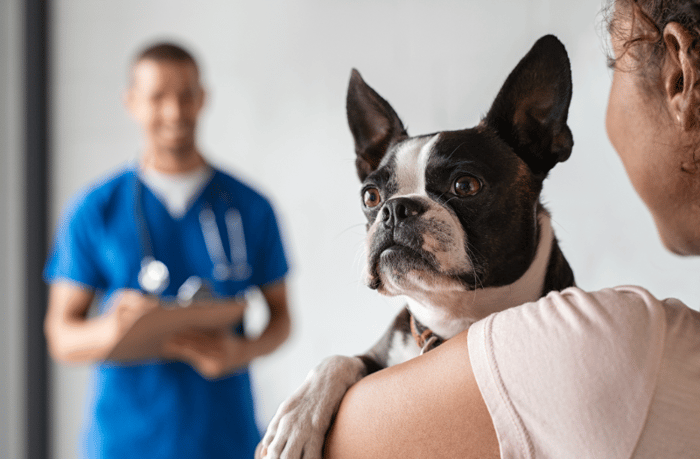
What to Expect at Your Pet’s First Vet Visit
Getting a new animal companion is an exciting and rewarding endeavor. However, it’s crucial to ensure that the new pet has the medical attention and support that it needs, not only in the early stages of its life but also well into the future.
The first visit to the vet is especially important as it will give us a chance to get to know each other and establish routine care for you pet based on their needs. Since we will be covering a lot of ground, we ask that you allot 45 minutes for that first visit (and occasionally longer based on health status)
Just like with people, establishing a relationship with a medical professional is essential for maximizing good health and quality of life. Not only will this first visit set a baseline to be measured against in future visits, but it also allows the vet to get to know the pet, as well as establish a relationship with the owners, allowing a mutual bond of trust to be formed.
When Should Kittens Have Their First Vet Visit?
According to PetMD , new kittens should go to the vet at 6 to 8 weeks of age for their core vaccinations, and then again once every 3 to 4 weeks for booster vaccinations until the animal is 16 to 20 weeks old.
If you’re not sure how old your newly adopted kitten is, it’s a good rule of thumb to take them to the vet within the first week or two of adoption.
When Should Puppies Have Their First Vet Visit?
Similarly to kittens, newly adopted puppies should have their first vet visit at 6 to 8 weeks old to begin vaccinations and rounds of boosters.
While this may have occurred before adopting a new puppy, depending on their age, it is still best to bring a new puppy in to be introduced and examined within the first week or two of bringing it home, according to Dr. Jennifer Coates .
How to Prepare for Your Pet’s First Vet Visit
For new South Charlotte pet owners, bringing a kitten or puppy to their first vet appointment may feel like an intensive undertaking. However, with a some preparation and a thorough understanding of the process, the entire visitl can be made significantly easier and less anxiety-inducing for them — and you.
Here are some tips to help you get ready for your pet’s first vet appointment.

Know Your Pet's Medical History
It is essential for a pet’s new vet to have a full, foundational understanding of the pet’s health. From any medical issues that it may have had in the past to its activity, diet, and other details, many factors like these are critical to making the first visit as productive as can be.
While many intake or pre-examination forms will most likely request this information before a visit, stating and explaining any preexisting conditions, allergies, or adverse reactions to medication will ensure your pet can be properly treated while preserving their safety and comfort.
It cannot be stated strongly enough that if previous medical records for any pet that is going to a new vet exist, THEY MUST BE PRESENTED EITHER AT OR (PREFERABLY) PRIOR TO THE FIRST VISIT. Without these records, we at Ballantyne Veterinary Clinic will not be able to assess what has been done for the pet in the past and therefore what is needed both at this visit and in the future. Additionally, if previous diagnostics have been done and we don’t have copies of results, we will either be making medical decisions in the dark, or will need to repeat them. We generally recommend sharing the previous vet with us when you schedule the appointment and we will call them for records to ensure they can be reviewed prior to the appointment.
Next, it is important to discuss the pet’s typical activity level or exercise, as well as their diet, including what food they eat and how much (take a picture of the bag). This can assist in establishing a proper diet and weight maintenance plan moving forward.
In a similar vein, noting behavior problems, changes, health concerns, and living arrangements is essential, especially on the first visit. Not only can the vet recommend action to mitigate or improve any of these factors, but it will also allow them to get an idea of the general disposition of the animal, as will be discussed later.
Finally, if it is known that the pet has had issues with pests, parasites, or toxins recently, the first visit is the best time to bring such issues to attention.
Address Known Behavior Issues Before the Visit
It’s not uncommon for any pet to be fearful of going to the vet. If your pet has previously known anxiety at the vet’s office, please let us know. If your pet has been previously prescribed medications for stress, go ahead and give them prior to the visit. While we are happy to prescribe medications for pets who are stressed out at our office, we do have to see them first to do so.
If you have developed previous strategies with a vet to help with your pet’s anxieties, please share them with us. Knowing that a pet does best while muzzled, or away from their owner, can help us manage the stress of the visit. Additionally, we will help develop ongoing strategies for pets who are stressed as we want them to be happy coming to see us. Over time we have been very successful in helping pets with high stress levels at the office become much more tolerant of visits with us, with nothing more than taking the time to get to know them so we can determine what works best.
Understand What the Appointment May Include
While the agenda of an initial vet appointment will vary based on your pet as an individual, it will generally include a few key components. Below is a list of standard first-visit physical checks that can be expected at Ballantyne Veterinary Clinic:
- Check weight and temperature
- Observe eyes and ears for signs of chronic changes, disease, or other concerns
- Assess the pet’s gait, standing stance, long bones and joints for symptoms of pain or decreased mobility
- Examine skin and coat condition
- Assess oral health and dental hygiene
- Palpate, or feel, the abdomen to check internal organs
- Listen to the heart and lungs to assess their overall health
In addition, it is important to bring a fecal sample to the pet’s first visit unless a fecal has been performed recently. This can help detect potential parasites, bowel and intestinal conditions, bacterial infections and imbalances, and other pressing concerns. Additionally, it can give a significant amount of information about the overall health of any new pet.
Questions to Ask at Your First Vet Visit
There is no prescribed set of questions to ask during a pet’s first vet visit. However, it is important to establish open communication with the new vet.
If there are any concerns, ensure they are written down prior to the appointment so they are not forgotten in the moment. Additionally, we will want to spend the time discussing problems to determine not only what solutions are available, but also which ones fit best for you and your pet.
Not all questions have to be concern-based, as general knowledge and lifestyle questions are a great way to learn more about how to promote a healthy lifestyle and choices throughout the pet’s life.
Schedule Your Pet’s First Visit With Ballantyne Veterinary Clinic
Your pet’s first vet visit may well be one of the most important. From building trust between the vet and yourself to ensuring an open line of communication, this appointment lays the foundation for the remainder of the pet’s time with the vet.
It is essential to come prepared with all medical and vaccination history, any questions you may have about your pet’s health or lifestyle, and any concerns or questions you may have about their behavior.
Since being well-prepared for your pet’s first visit can have a hugely beneficial impact on their health and well-being as they grow and age, knowing what to expect can be a big help. Contact Ballantyne Vet today to learn more or get started scheduling your pet’s first visit!
Related Articles:
When is an emergency vet visit warranted for your pet, tips for pet weight management | ballantyne veterinary clinic, all about pet seasonal allergies: symptoms, treatment, and more, get in touch with us:.
16139 Lancaster Hwy #100 Charlotte, NC 28277
704.926.7000
- Mon – Thur 8am – 5:30pm
- Friday 8am – 1pm
- Saturday Closed
- Sunday Closed
- Privacy Policy
- Terms & Conditions
- Site by LAIRE
10 Extremely Important Questions You Must Ask Every Time You Go To The Vet

If you're anything at all like me, you worry more about your pet's health than your own.
Martha Stewart Posts Nude From 1996, Reminding Us All That She's Queen Of The Thirst Trap

Whether or not that is healthy for you is one thing. But it is certainly a great idea to stay in touch with how your pet is feeling and acting. While I may worry about it a bit too much from time to time, a healthy dose of concern for a pet's health will keep her around for much longer.
It's very important to take your pet for yearly checkups at the vet , though it's just as important to show up prepared.
Keeping track of your pet's behavior and gathering up a running list of questions you have for the veterinarian is crucial. Your pet can't tell you what's wrong, so you have to be very observant and go into vet appointments armed with all the right questions.
These 10 things are all essential questions to ask your vet when you go in for that yearly visit, even if it's the very first one.
Do you have a yearly visit scheduled for your pet? Please SHARE with your family and friends on Facebook!

1. Should I Feed Her Better Food?
We all know that nutrition is important, but how often do we think about what we feed our pets ?
It's important to ask your vet if you are giving your animal the right kind of food, as it is not all created equal. The needs will be different for each individual pet.

2. Should I Get Pet Insurance?
Not everyone knows that you can get health insurance for your pet.
Ask your vet about where to get started before a major illness or accident happens so that you're nice and prepared.

3. How Is Her Weight?
Some pets love to eat, eat, eat whenever they get the chance. Others have to be encouraged to eat. Asking your vet about your fur baby's weight can spark an important conversation about your pet's eating habits and activity levels.
You will also find out if there is anything you need to change about the way to feed your pet.

4. Is This Behavior Normal?
Pets itch, sneeze, and get out of breath just like we do. However, if you notice a pattern of when your pet might be doing one or more of these things, ask your vet if that behavior is normal.
Does your pet wheeze after a few minutes of play? It could be nothing, but it could also be indicative of a bigger issue that your vet may not pick up on because your pet isn't wheezing on the examination table.

5. Does She Need Her Teeth Cleaned?
Animals are really great at hiding pain, especially cats. Just because your animal is behaving normally doesn't mean that everything is A-OK in there. Pets over the age of 5 are at risk for numerous periodontal diseases , and you should absolutely ask your veterinarian about a tooth cleaning.
You should also ask if there is anything you can do at home to improve your pet's dental health.

6. What Kind Of Flea And Tick Medicine Should I Be Using?
There are tons of different kinds of flea and tick medications out there for your pet, and you should certainly ask your veterinarian what is right her given her circumstances.
Fleas and ticks can be incredibly harmful to your pet, so you definitely want to keep those parasites in check.

7. I Felt A Bump The Other Day. Is That Normal?
Pets do tend to get fatty lumps on their skin as they age, but bringing it up with your vet can save your pet's life — those bumps aren't always harmless.
Pointing out bumps on your pet's skin will help your vet decide if it needs to be biopsied for cancer.

8. Should I Get A Second Opinion?
Just like people doctors, veterinarians are always working to the best of their personal knowledge and experience. It is entirely possible that your pet is undergoing something that your vet, whom you may trust very much, has never seen or heard of before.
If their diagnosis doesn't sit right with you, or you suppose that they are not sure, don't be afraid to ask if a second opinion would be a smart idea.

9. Would You Recommend Any Other Tests?
Blood tests, rectal exams, X-rays — it never hurts to bring up the idea of further testing for your pet, especially if she's up there in age or if you have noticed strange behaviors. Remember that pets can't relay discomfort or symptoms to you, so you have to be proactive about their health.
A reminder about vaccines and preventative shots is also helpful, just in case your veterinarian neglected to check if your pet is up to date.

10. What Should I Do Between Now And Our Next Visit?
Before I leave the vet's office, I always make sure to ask if there are any warning signs of illnesses that I should look out for. Your vet might have some bright ideas about how to stay super vigilant of your best furry friend's health, such as the way they sound, how much they're sleeping, how much they're itching, where they're itching, or the contents of the litter box or plastic baggies.
You should also make sure to know exactly how and when to administer any medication you're given.
How important is your pet's health to you? Please SHARE with your family and friends on Facebook!
Around the Web
Ein Einfacher Trick Gegen Gelenkschmerzen

This Video Will Soon Be Banned. Watch Before It's Deleted

Try Not to Gasp at David Schwimmer's New Plastic Surgery Pics

Want your content to appear on sites like this?
Want to report this publisher's content as misinformation.
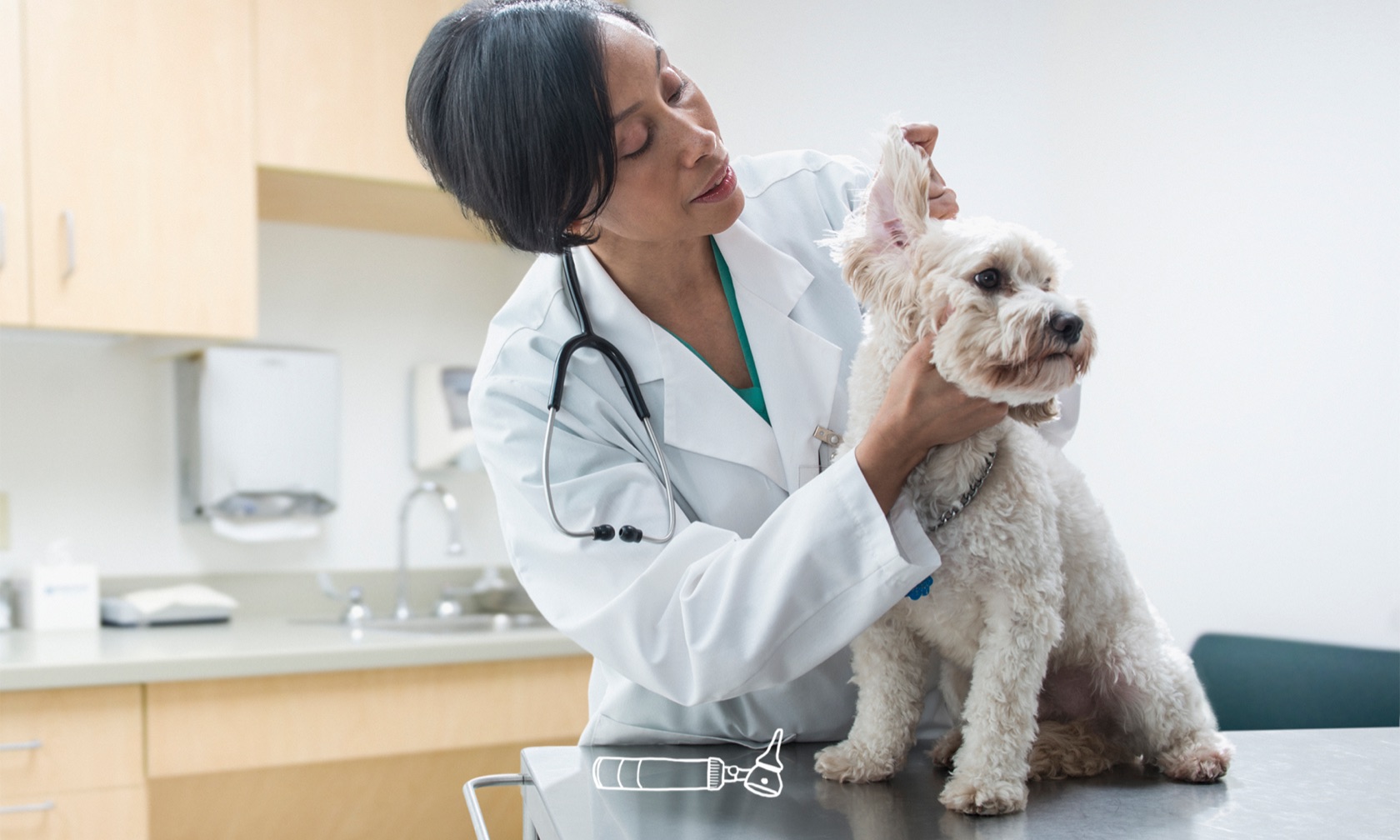
Tips for Making Your Pet’s First Vet Visit a Success
You’ve picked up their favorite toys, stocked up only the best pet food, and have pet-proofed your home. You’re clearly ready to bring your pet home, but what happens after that? Hopefully the answer is scheduling your pet’s first veterinarian visit . While the first visit can seem daunting, we’ve rounded up a few of our favorite tips to make the process as smooth as possible.
Set up a Veterinarian Visit Right Away
Even if your pet was checked out by a veterinarian when they were at the shelter — or seems perfectly healthy to you — you’ll still want to make an appointment within the first week or so. Why? Your dog or cat may be due for additional medications to keep them (and you) safe in their new home.
- Prepare your questions ahead of time, even if that means writing them down.
Additionally, no one ever expects an emergency to occur—especially in those first happy moments at home—but establishing a relationship with a local vet early on will give you peace of mind if you find yourself in an emergency situation.
Schedule Your Visit Early
It’s best to schedule your veterinarian visit for the morning, when delays are less likely. And arrive a few minutes early so you can help get your pet settled and fill out any paperwork. If your veterinarian offers patient forms online, fill out any paperwork at home, so your visit goes even more smoothly.
Bring All the Proper Items With You
There’s a lot you can do to help your pet’s first veterinarian visit run smoothly and get the most out of your time there.
- Bring your adoption papers from the shelter. This will help your veterinarian get to know your pet’s medical history, and which vaccines they’ve already had, or still need.
- Bring a list of any medications or supplements your pet is on, how often they take them, as well as the food you’re feeding them. If it’s easier, just bring the medications with you to the office. You can then explain what each one is and why your pet needs it.
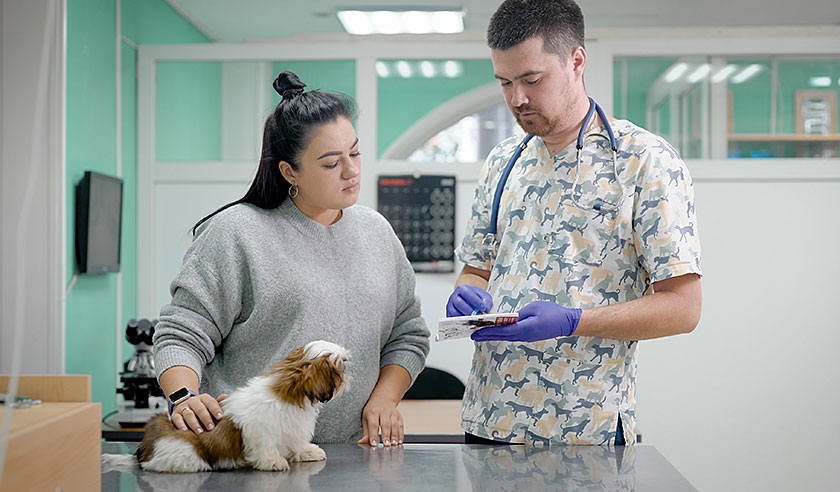
Tricks of the Trade
Bring Treats Is there one that your pet really loves? Bring some for your veterinarian and their assistants to give to your pet during the appointment.
Leave the Room If you’re squeamish around needles, it’s best to leave the room. Your pet might even pick up on your anxiety and get more stressed out themselves.
Celebrate! Once you’re back at home, do something fun with your pet to help them relax after their visit.
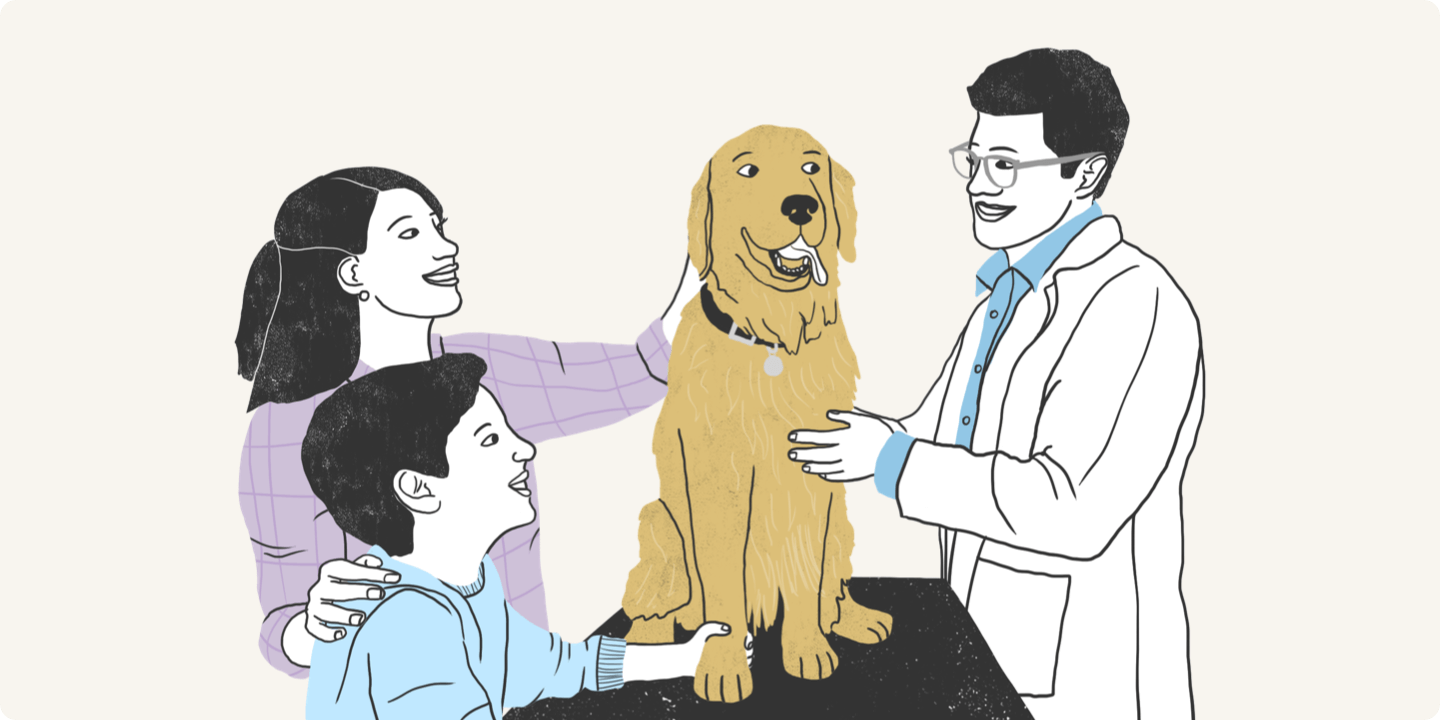
What to Expect for Your Pet’s First Visit to the Veterinarian
At your first appointment, you’ll work together with your veterinarian to gather clues about your pet’s dietary needs, training, and any deeply hidden problems they might have. It’s also a perfect opportunity to discuss topics like pet proofing, training, and parasite protection.
Your veterinarian will thoroughly examine your pet, looking for things like heart murmurs, ear infections or even worms.
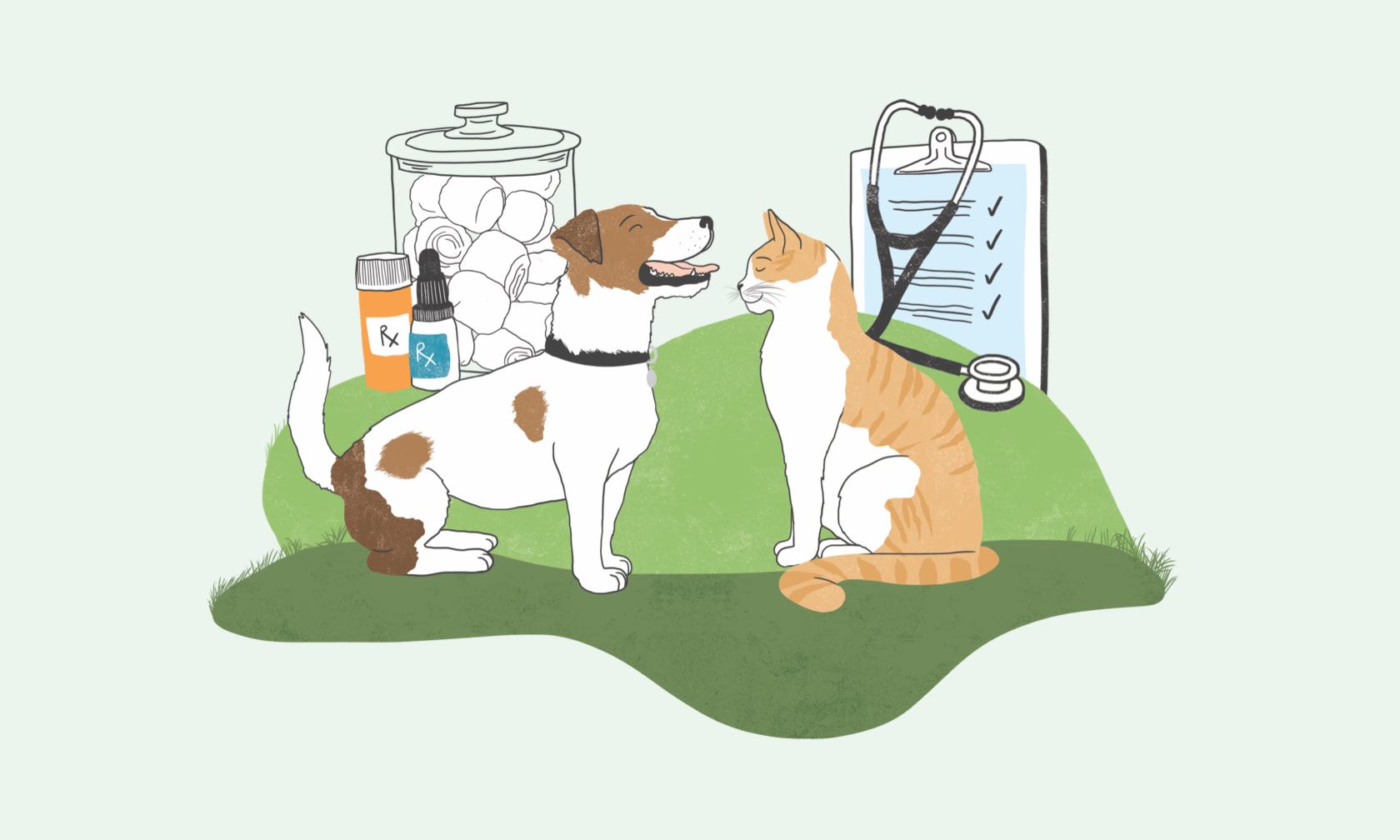
ZPC-00183R2

Claire Walther, DVM
Dr. Claire Walther was born and raised in Dayton, Ohio. She received her BS and DVM from Purdue University in West Lafayette, Indiana. While at Purdue University, she graduated with honors for her research. During her veterinary education, she acted as a clinical pathology technician and developed a keen understanding of clinical laboratory testing. She practiced outside Indianapolis in corporate (Banfield) and independent general practice before joining Zoetis in 2016. Dr. Walther is currently the Zoetis Petcare HQ Feline Pain Strategy Director.
The Walther family includes 3 dogs (Sundae, Eva, and Vanilla Bean) and two cats (Gambit and Linkin). It is the love she shares for her family, both human and animal, that fosters her drive to enhance our ability to detect, prevent and treat disease within the field of veterinary medicine.
Sign-up for the Latest Vet‑Approved Health Tips, Giveaways, and More
Recommended for you.
Sign-Up for Vet-Approved Health Tips, Giveaways, and More
By signing up you agree to our Terms of Use
- Revolution Plus
- Simparica Trio
- View All Products
- Rewards Overview
- Ways to Earn
- Adoption Guide
- Vet Professionals
The product information provided in this site is intended only for residents of the United States. The products discussed herein may not have marketing authorization or may have different product labeling in different countries. The animal health information contained herein is provided for educational purposes only and is not intended to replace discussions with an animal healthcare professional. All decisions regarding the care of a veterinary patient must be made with an animal healthcare professional, considering the unique characteristics of the patient.
All trademarks are the property of Zoetis Services LLC or a related company or a licensor unless otherwise noted. ©2024 Zoetis Services LLC. All rights reserved. ZPC-01562R1
- Privacy Center
- Terms of Use
- Do Not Sell/Share My Personal Information
Be a smarter pet parent
Next time, skip the web. Get health tips and wellness advice for your pet straight to your inbox.
- dog parent basics
How to prepare for your puppy’s first vet visit
Learn how to prepare a proper puppy checklist ahead of your pet’s first veterinarian visit.
— Medically reviewed by Dr. Erica Irish
Everything we create is factually accurate and biased toward science → meet our team of experts
Dr. Dwight Alleyne
Updated December 12, 2023
When to schedule your puppy’s first vet visit
Before your puppy’s first vet visit, your new puppy’s first vet visit, after your puppy’s first vet visit, the cost of a vet visit, frequently asked questions, the essentials.
- Puppies need their first vaccinations at 6-8 weeks — The first round of core vaccines should be given around the time puppies get adopted, or even before that, depending on the breeder or shelter.
- Pet care costs can vary greatly — Some pet insurance plans cover routine care, but most don’t. It’s best to save up a few hundred dollars ahead of time so you’re prepared whether you plan on paying out of pocket or not.
- Make follow-up visits a part of your routine— Puppies should go to the vet every few weeks from the age of six weeks to four months to receive vaccinations and undergo routine wellness checks.
Your puppy’s first veterinarian appointment is a crucial step to starting on the road to a healthy life. Before you bring your new puppy home, you’ll want to schedule their first vet appointment so you can get started on the right track. Puppies should go to their first vet visit around six to eight weeks old so that they can receive their first round of vaccinations .
If you rescued your pup from a shelter, they’ve probably already received their shots and may be spayed or neutered . However, it’s still a good idea to take them to the vet as soon as possible to establish a complete medical record and catch any potential health issues . It’s important to make your puppy’s first visit a positive experience, so be sure to do your research and gather essential supplies before you go so you feel prepared and relaxed.
The best time to take your puppy to the vet is as soon as you can after bringing them home. Very young puppies have antibodies from their mother’s milk that protect them against diseases; however, these antibodies start wearing off at around six weeks old, leaving them with a vulnerable immune system. This is when it’s recommended for them to get their first vaccines and around the time many people adopt.
Another reason to schedule your first vet visit early on is to get started on what the American Veterinary Medical Association calls the “ veterinary-client-patient relationship (VCPR) . Trusted Source American Veterinary Medical Association (AVMA) Not-for-profit organization representing 97,000+ vets. Go to source ” This refers to the three-way relationship between you, the vet, and your puppy. It’s important to have this relationship early on so the vet can get to know your pup and comfortably diagnose them if and when any future health conditions arise.
A preliminary check-up is helpful even for healthy puppies because it can establish a baseline of normal behavior for your pup and make them feel like going to the doctor can be a positive experience since they don’t just go when they’re sick.
⚠️Never adopt a puppy that’s younger than 8 weeks old. Puppies should stay with their littermates until they’re at least 8 weeks old to receive the nutrition they need from their mother’s milk and for social training with their littermates. Puppies who are adopted out too early may be more likely to develop behavioral problems and may fail to thrive.
If you adopt a puppy from a shelter, they’ve likely already had at least some vaccines and may be spayed/neutered. Their medical record should be included in their adoption folder, and you’ll need to take it with you to the initial visit to the vet. If you buy a puppy from a breeder, they may or may not have had any medical treatments yet, so be sure to ask for papers.
Make sure to bring any medical records you may have received from the breeder or shelter with you on your puppy’s first veterinary appointment.
New puppy checklist
Once you’ve made the appointment and brought your puppy home, there are still a few things you’ll need to do before loading them in the car and taking off to the local clinic. Here’s a short checklist of what you’ll want to bring with you:
- Medical records including any current medications if applicable
- Stool sample in a sealed plastic bag
- Collar or harness
- Old towel or blanket
- Dog carrier
- List of questions or concerns
- Notes on what kind and how much food your puppy has been eating
If your vet lets you fill out their intake paperwork ahead of time, it’s best to try to write it all down at home instead of struggling with a squirming puppy in your lap. You should take your puppy into the office attached to a leash but try to keep them off the floor before they’ve had their vaccines to prevent them from being exposed to infectious diseases. If you feel like you can’t carry them in your arms or keep them in your lap, you might want to bring them in their crate instead.
Your puppy’s first consultation starts with a thorough exam around 6-8 weeks old. Your vet will thoroughly assess their skin , fur , eyes , ears , nose , mouth, teeth , feet , and genitalia. They will also weigh your puppy and check their heart rate. Finally, they will check for intestinal parasites and conduct a fecal exam. They’ll likely ask you to bring along a stool sample from your puppy, but they’ll let you know in advance. If they don’t ask, they will likely collect one during the appointment.
1. Vaccinations
Puppies are due for their first round of shots by the time they’re 6-8 weeks old. Since most reputable breeders start adopting their puppies out between 8 and 12 weeks old, chances are that they haven’t received all of their shots yet. On your initial vet visit, your puppy will often receive their first round of vaccinations .
On later trips, puppies will need further rounds of vaccinations (generally about every three weeks until 16 weeks of age). So remember to keep up with their vaccination schedule!
There are two core vaccines — The first is commonly noted as DAPP or DHPP . This combo vaccine protects puppies against canine distemper , canine hepatitis Trusted Source The Merck Veterinary Manual Trusted provider of veterinary medicine. Go to source , parainfluenza , and parvovirus . The second core vaccine is the rabies vaccine. This might be given on their first vet visit or follow-up appointments depending on the dog’s age and the relevant state laws .
There are also other non-core vaccinations — These will vary based on location and lifestyle, including whether pups spend more time outdoors or indoors, or are exposed to dog parks or other animals frequently. This includes canine influenza, leptospirosis Trusted Source Cornell University College of Veterinary Medicine Veterinary school. Go to source , and bordetella, or kennel cough . If you live in a rural area that sees a lot of snakes, your vet may also recommend a rattlesnake venom vaccine to give your dog some time in case they’re ever bitten far away from a hospital.
2. Preventative medications
You should talk to your vet about flea and tick control as well as heartworm prevention on your puppy’s first visit. Based on several factors, flea and tick prevention could consist of oral medication, topical treatment, or a specialized collar. The American Heartworm Society recommends year-round flea and tick prevention for all dogs in the USA. Many puppies are born with worms, so they will also need a dewormer.
3. Nutrition
Your vet will also be able to give you advice on what type of food your dog should be eating and how much at each life stage. It’s important to know what type of food you’re already feeding your puppy, as well as how much, and discuss these things with your vet. They’ll either approve it or may recommend a diet that’s more appropriate for their breed, life stage, or individual health.
Optional procedures worth discussing with your vet
Microchipping your puppy isn’t mandatory, but your vet will likely recommend it. The process involved inserting a small electronic chip between your dog’s shoulder blades. That way, if your dog ever gets lost, any vet will be able to identify them by scanning the microchip. You can have a microchip implanted during a regular visit or during the spaying/neutering procedure.
👉 If you prefer not to microchip, you might invest in a tracking device or a FidoTabby Alert collar in case they ever get lost.
Spaying or neutering may be something you’ll want to consider. Besides preventing unwanted canine pregnancy (and a large number of puppies in shelters), spaying and neutering have some benefits, such as reducing some health risks and helping with behavior problems.
“Most veterinarians recommend spaying and neutering around 6 months depending on the breed of the dog. Some veterinarians may recommend spay and neutering larger breed dogs at 1 year of age or older.”
Once that all-important first visit is in the books, it’s essential to follow up by scheduling future appointments for your puppy to complete their vaccination schedule. For most of the core vaccinations, puppies will need the first round at 6-8 weeks, the second round at 9-11 weeks, the third round at 12-14 weeks, and the fourth round at 16-17 weeks. After that, there will be booster shots when they’re a year old.
However, this schedule varies slightly from vaccination to vaccination. For rabies, the first vaccination will happen at around 12-16 weeks (depending on state law), and then there will be booster shots from 12-36 months depending on if they received the annual or 3-year rabies vaccine.
The price of your dog’s first veterinary appointment will depend on a variety of factors, such as your geographic location and the size of your pet. Some vet clinics may offer package deals to keep the costs down, such as veterinary wellness programs, but not all do.
Here’s a ballpark estimate of what you’d typically expect to pay individually for several procedures:
Spaying and neutering costs are more varied and often depend on the dog’s weight. Costs can range anywhere from around $45 at a low-cost clinic to as much as $300 or more at an animal hospital. Spaying will usually cost a bit more than neutering because it is a more complicated process.
If you want more details, you can always call your local vet office for a more precise quote, as well as any potential financing options, so you can know how to plan ahead.
Your puppy’s first visit to the vet can feel daunting, especially if you’re a new pet parent. However, once you’ve been a few times for regular visits, you’ll feel like a pro. Preparing everything you need beforehand can help you (and your new pet) feel more confident on the big day, and start them out strong for the amazing adventure you’ll have together in the years ahead.
How can I make my dog feel more at ease during their first vet visit?
Even though you’re not the one taking the shots, it’s natural for you to be nervous during your puppy’s first vet visit. However, dogs feed off your energy, and if you’re stressed out, that will make them stressed, too. It can help to make your vet appointment before you adopt, so you don’t have to worry about availability.
It might also be helpful to stop by the vet office beforehand, get the lay of the land, gather brochures and other information about vaccines, etc. and introduce yourself to the staff. If you’re more comfortable and relaxed in the setting, that can really help the puppy relax as well.
Would pet insurance cover my puppy’s first vet visit?
Pet insurance can literally be a lifesaver when it comes to emergencies and long-term illnesses. However, wellness visits aren’t always covered under typical policies. If your policy doesn’t cover routine exams, be sure to save up a few hundred dollars before you go or ask to see if you qualify for a payment plan, such as CareCredit.
When should a puppy go to the vet for the first time?
Puppies are due for their first round of shots by the time they’re 6-8 weeks old. Chances are, they’ll need their shots as soon as you bring them home. Even if you’ve adopted from a shelter or breeder who’s taken care of the vaccinations for you, it’s still a good idea to take your dog to the vet for a thorough examination to make sure there aren’t any health concerns. Establishing the relationship with your vet early can also make everyone feel more comfortable for any sick visits that may arise in the future. If your puppy’s health isn’t good, it’s especially important to go to the vet as soon as possible to receive an accurate diagnosis of your pet and receive necessary information about their condition, including medical advice for treatment.
How soon after I get a puppy should I take it to the vet?
Ideally, you should schedule your puppy’s first veterinary appointment before you bring them home so that you can take them within the first couple days after they’ve been adopted. If you couldn’t say no to the adorable eyes at the adoption event, just be sure to schedule them as soon as possible for a physical exam and to catch them up on any vaccines they may be missing.
How much does it cost to vaccinate a puppy?
There are two core vaccines for puppies, DAPP or DHPP, which is usually administered around 6-8 weeks, and rabies, which is legally due in most states by 16 weeks. Both of those vaccines together should cost between $75-$100, but the exact total will depend on factors such as your geographic location and the clinic that you choose. If you choose to include optional vaccines, such as Bordetella, it will cost you a little extra.
Realizing your dog can’t see as well as they used to can be terrifying. Learn the signs and what to do if your dog has them.
11 min read
Taking your pet on vacation doesn’t have to be a hassle, especially when you know how to find the ideal pet-friendly rental.
Discover insights into navigating legal issues with pet-friendly rentals as both a tenant and landlord.
10 min read
The essential knowledge you need to nurture your furry little friends.
16 min read
Puppy’s First Vet Visit: What to Expect, Checklist and Tips
By: Jennifer Coates, DVM Updated: September 12, 2023
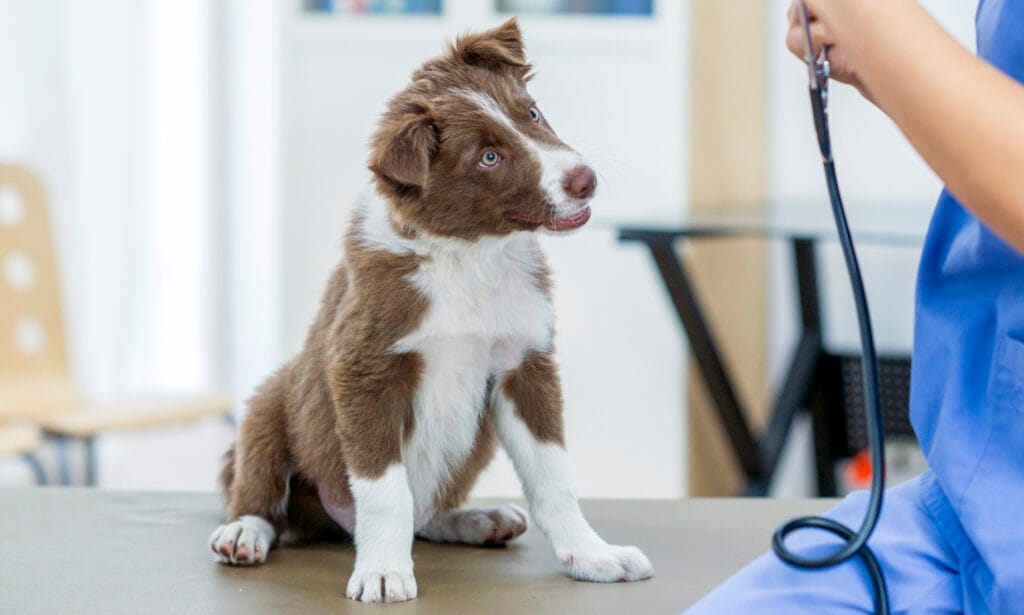
Home / New Pet / New Dog / Puppy’s First Vet Visit: What to Expect, Checklist and Tips

S o cute! So sweet! So… sick?
Puppies may act like they’re up for anything, but because of their immature immune systems, they’re quite susceptible to illness and injury. It’s absolutely vital that you schedule your puppy’s first vet visit within the first few days of bringing them home. Healthy puppies need to start on their preventative care so that they can stay healthy, and sick puppies need treatment before their condition becomes serious or even life-threatening.
If you’re the proud pet parent of a new puppy, here is what you should know about taking your puppy to their first vet visit.
When to Take a Puppy to the Vet for the First Time
Many dog shelters and breeders start vet visits for puppies before they release their little ones to new pet parents. You should receive paperwork that clearly states what type of care has already been provided, when that occurred, and when you should schedule your puppy’s next veterinary visit.
But regardless of what the shelter or breeder has already done, it is always a good idea to schedule a new puppy vet visit within a few days of picking up your new canine companion. This will allow the veterinarian to review your pup’s records and quickly provide any overdue care. The doctor will also perform a complete physical examination and perhaps run some laboratory tests to identify any potential health concerns. It’s best to learn about problems as soon as possible before any health guarantees the breeder provides expires.
A typical vet schedule for puppies is for appointments to occur every 3 to 4 weeks starting when puppies are 6 to 8 weeks old and ending when they are 4 or 5 months old. Most puppies start their vaccinations when they are 6 to 8 weeks old. Puppies who receive their first vaccinations when they are older than 4 or 5 months of age can usually be caught up in two visits scheduled 3 to 4 weeks apart. Your veterinarian may adjust this plan based on your puppy’s particular history and needs.
Get a complete guide to dog vaccines .

How to Prepare for Your Puppy’s First Vet Visit
Collect as much information as possible in the days before your puppy’s first vet visit. Has your puppy traveled from a different part of the country or world? Are you starting to notice behavioral problems as your pup settles in? Does your puppy have a good appetite with no vomiting or diarrhea? Is potty training proceeding as you expected?
While it is, of course, fine to answer a vet’s question with “I don’t know” (you can always call back with the answer), the more information you can provide during the appointment the better.
What to Bring to the Veterinarian Appointment
Collect everything you’ll need to bring with you for your puppy’s first vet visit.
Puppy’s First Vet Visit Checklist
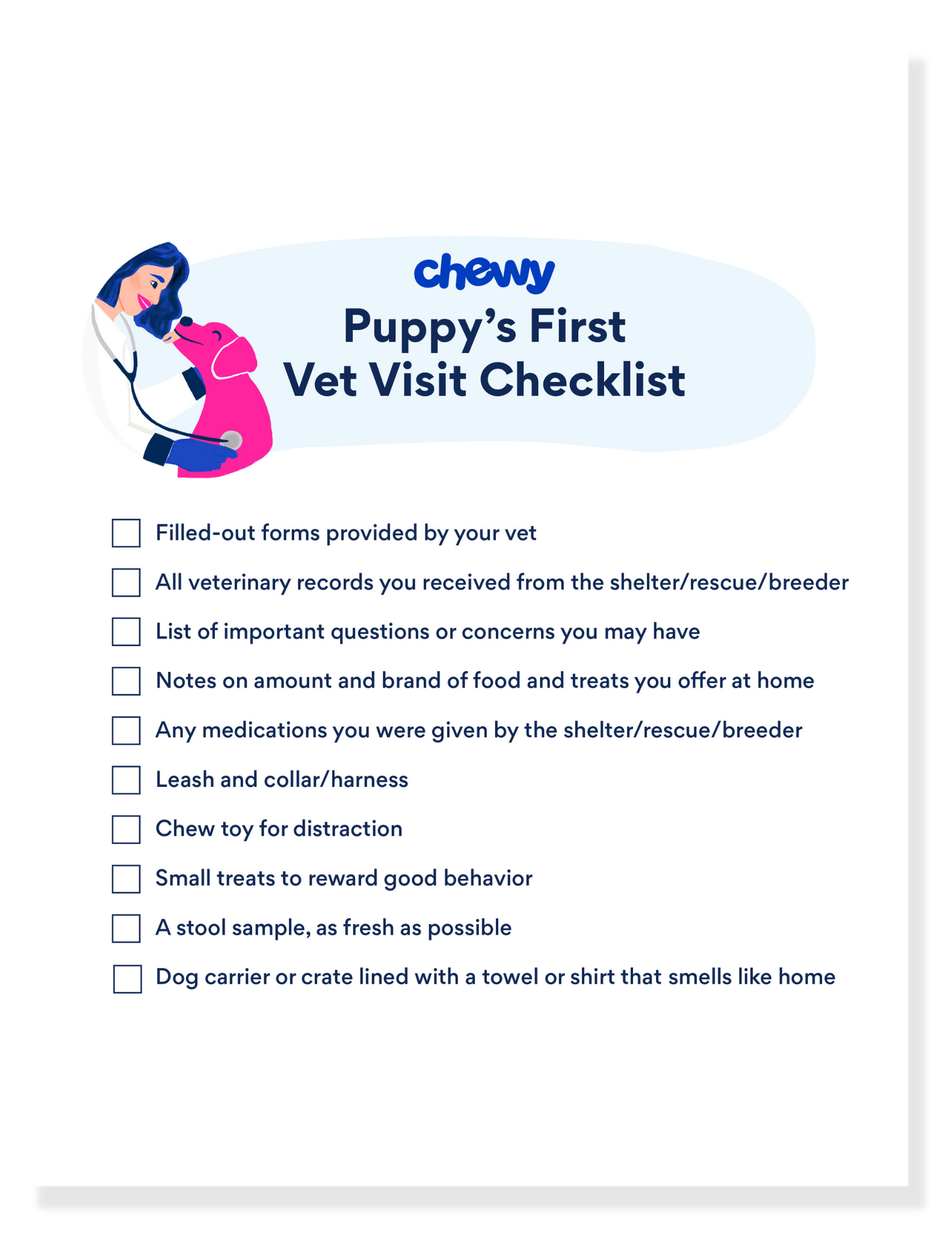
- Any veterinary records you received from the breeder or shelter
- Written list of important questions or concerns that you might have
- Notes on how much of what types of foods and treats you offer at home
- Dog carrier or crate lined with some old towels or shirts that smell like home
- Leash and collar or harness
- Chew toy for distraction
- Small treats to reward good behavior
- Any forms provided by your veterinarian that you have already filled out
- A stool sample, as fresh as possible
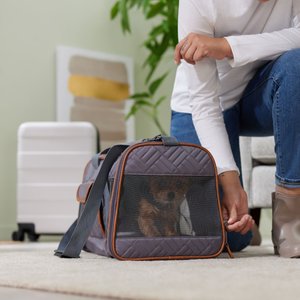
What to Expect During Your Puppy’s First Vet Visit
Veterinary staff will start the visit by asking you a series of questions about your puppy’s history and how they are doing at home, followed by:
- A weight check
- Measuring body temperature and pulse and respiratory rates
- A complete physical examination, which includes
- Observing the puppy move around the exam room
- Looking at the whole body including the eyes, ears, nose, feet, nails, skin, coat and genitalia
- Opening the mouth to observe the teeth, gums and other structures
- Checking the eyes and ears with instruments that provide light and magnification
- Palpating (using hands to feel) the lymph nodes, joints and organs within the abdomen
- Using a stethoscope to listen to the heart and lungs
- Checking reflexes
If you didn’t bring a stool sample with you from home, your veterinarian may need to collect one to check for intestinal parasites. If your puppy is 6 months old or older, the doctor or veterinary technician may also draw a small sample of blood for heartworm testing. Other lab work is run on an as-needed basis.
Throughout all the new puppy vet visits, the veterinary staff will discuss many important aspects of dog care with you including:
- Exercise and play requirements
- Behavior and socialization
- Pet identification, including microchips and tags
- Reproductive health, including the benefits and risks of spaying and neutering
- Dental care
- Grooming needs
- Travel requirements
- Pet safety and disaster preparedness
- Flea, tick, heartworm and internal parasite control
- Vaccination schedules
- Diseases that can be spread from pets to people (and vice versa)
Download our Puppy Vaccinations Tracker printable .
Questions to Ask the Veterinarian
Your veterinarian should provide you with all the information that you need to help your puppy thrive, but look over the topics listed above. If your veterinarian forgot to address something or the information they provided was confusing, don’t hesitate to ask for clarification.
Cost of a Puppy’s Vet Visit
Most of what happens during a puppy’s first vet visit is quite routine and therefore not very expensive. Veterinary costs vary based on where you live, but be prepared for something in the range of $75 to $100 per puppy visit. Call your veterinarian for a more precise estimate so there are no unpleasant surprises. Veterinary wellness plans, vaccine clinics and pet insurance can all help you keep your costs down or spread them out over time.
While vet costs for puppies may seem high, it’s money well-spent preventing potentially serious and expensive health problems from developing later. After all, to be happy, a dog must be healthy.
More about caring for your puppy:
- Puppy Feeding Guide: How Much to Feed a Puppy and More
- Puppy Stages: What To Expect From Your Pup in the First Two Years
- Why Is My Puppy Whining? And How Can I Comfort Them?
Featured Products
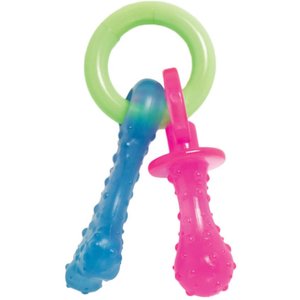
Related Posts
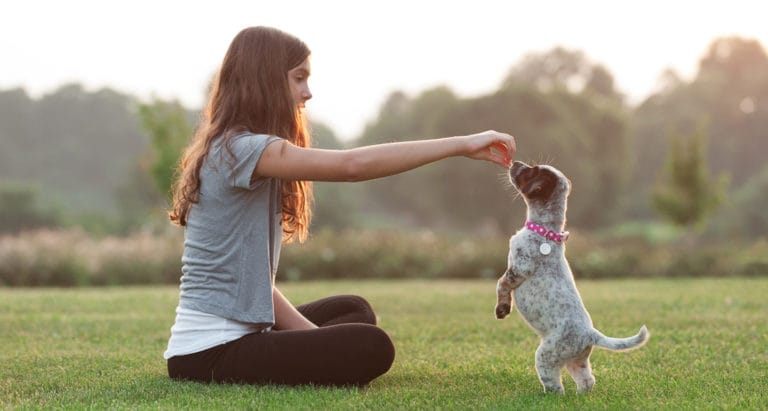
Puppy Training 101: Your Guide to Mastering Basic Puppy Training
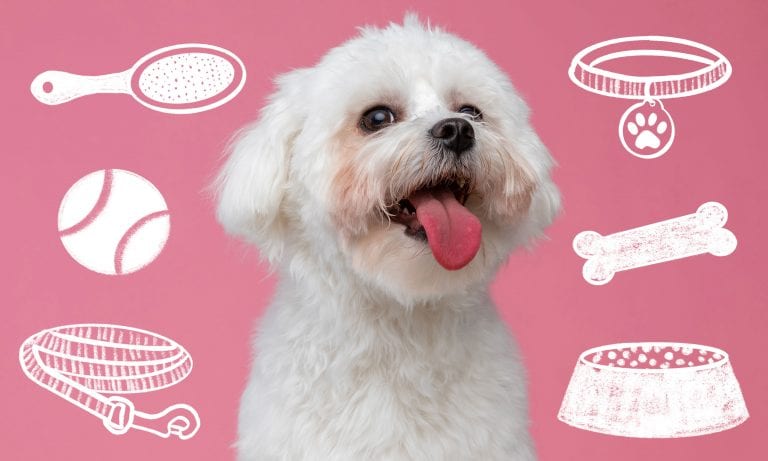
New Puppy Checklist: 9 Things You Need Before Bringing Home a New Puppy
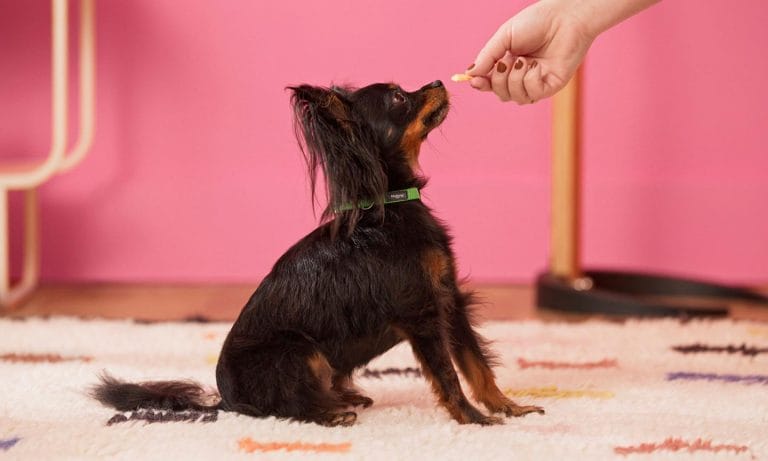
Your Essential Guide to Basic Dog Obedience Training
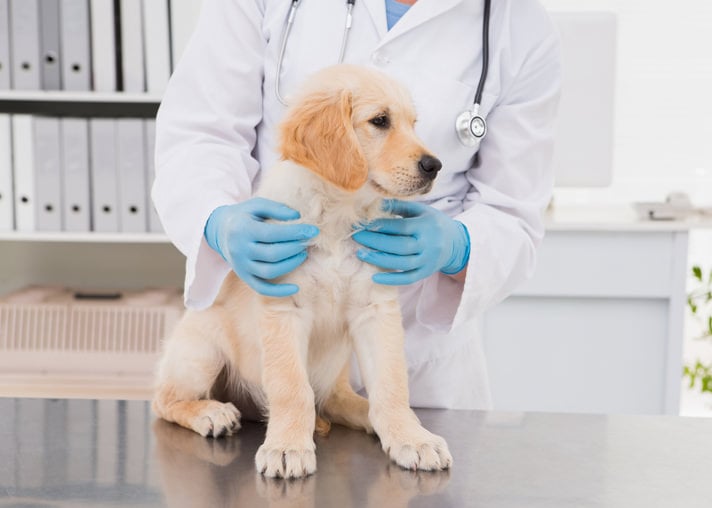
15 Questions Veterinarians Wish You Would Ask About Your Puppy

Bringing a Puppy Home? Here’s Everything You Need to Know
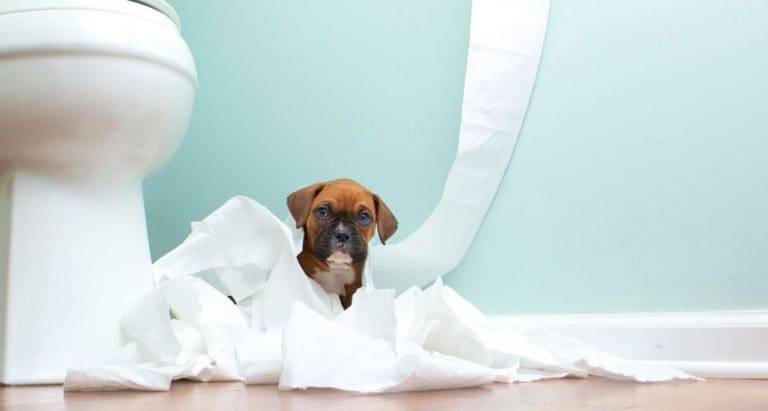
Puppy-Proofing The Bathroom
- Health & Nutrition
- View all in be well
- Style & Decor
- View all in be home
- Get Answers
- View all in be smart
- People X Pets
- View all in be inspired
- Chewy Gives Back
- Shelters / Rescues
- View all in be generous
Most Popular

By: BeChewy Editors Updated: October 10, 2023
Learn what to feed a puppy at every stage in their development with this veterinarian-approved puppy feeding guide for new puppy parents.
More Details

By: Linda Rodgers Updated: October 13, 2023
Some plants can give your pup diarrhea, others are extremely poisonous and can cause serious problems.

By: Irith Bloom, CPDT-KSA Updated: October 10, 2023
Want to know how you can potty train your dog in 7 days? Follow along on one family’s potty training journey and learn how you can housetrain your dog, too.
What to Expect With Your Kitten's First Vet Visit
:max_bytes(150000):strip_icc():format(webp)/FrannyProfileHeadsho660x800-56a112a23df78cafdaa926b2.jpg)
When bringing home a newly adopted kitten, it is imperative that you get it checked out by a veterinarian as soon as possible. This is not only for your kitten's own health, but to also ensure that it doesn't share any serious communicable diseases. Ideally, your kitten would be examined prior to even bringing it home with you, but you should try to get it seen by a vet within 48 hours if the kitten appears to be healthy. If the kitten is showing any symptoms of an illness, such as watery eyes, sneezing , difficulty breathing, or failure to eat, it should be seen immediately. Regardless of whether or not you think your kitten is healthy though, you should keep your kitten away from other cats until a veterinarian gives your kitten the go-ahead for socializing.
What Does a Physical Exam Consist Of?
Just like an adult cat receives , your veterinarian will perform a thorough hands-on physical examination of your kitten in order to find physical abnormalities. This examination includes:
- Checking inside your kitten's mouth : Baby teeth , the tongue, and the roof of the mouth will especially be examined.
- Taking your kitten's temperature : A normal rectal temperature of a cat is about 99 F to 102 F. If your kitten's temperature is too high or too low, it may be an indication of a problem.
- Palpating your kitten's abdomen : Your vet will gently feel your kitten's belly for anything abnormal.
- Listening to your kitten's heart and lungs: A cat should have a normal rhythm to their heartbeat with no murmurs. The lungs should be clear with only air flowing through them.
- Testing your kitten's muscles and joints for mobility : Your vet will feel your kitten's legs, especially their knees, to make sure everything is the way it should be. They may watch your kitten walk around to make sure they have a normal gait.
- Checking your kitten's eyes : An ophthalmoscope may be used to examine your kitten's eyes. Your vet will also look for signs of illness including watery and crusty eyes.
- Checking your kitten's ears for mites : Heavy, black debris in the ears is a good sign that a kitten has ear mites . Ear mites are very common in kittens so your vet may swab a sample from inside the ear to check for microscopic mites.
- Combing your kitten's fur for evidence of fleas : Fleas love cats of all ages. A flea comb may be used to look for fleas.
What Lab Tests Will Your Kitten Need?
- Fecal analysis : You will probably be asked to bring a fecal sample from your kitten with you to your vet. The veterinary team will run tests using the fecal sample to check for parasites like intestinal worms, giardia, and other potential concerns. Your vet may administer a de-worming medication to your kitten at each visit since not all intestinal parasites show up on fecal tests and a large percentage of kittens have them. Many parasites can be passed on to people, so it is important to eliminate them from your kitten.
- Blood tests : The American Association of Feline Practitioners recommends testing for FeLV and FIV on all newly-adopted cats, regardless of age, and whether or not there are other cats in their new home. If your kitten is younger than nine weeks of age, your veterinarian may want to wait until it is at least nine weeks old before testing for FeLV and FIV since kittens less than nine weeks of age are more likely to show a false result. If other cats are in the home with your young kitten, it is recommended to keep them isolated until they have tested negative for FeLV and FIV in case your new kitten has a transmissible disease.
Discuss Vaccinations
Most states require cats to receive at least a rabies vaccine, which is not done until your kitten is a little older. You should also discuss other vaccines, such as rhinotracheitis, calicivirus, and panleukopenia with your veterinarian. Vaccines need to be given at certain ages and in specific intervals to be effective.
Schedule Your Kitten to be Spayed or Neutered
Unless this was done prior to your kitten's adoption, you'll need to make an appointment for this surgery. Spaying and neutering are usually done around five to six months of age but some veterinarians will recommend it be done earlier or later.
More from The Spruce Pets
Your Puppy's First Vet Visit
Learn more about what to expect at your puppy’s first vet visit. Read about questions to ask the vet to lead your pup to good health and wellness success.
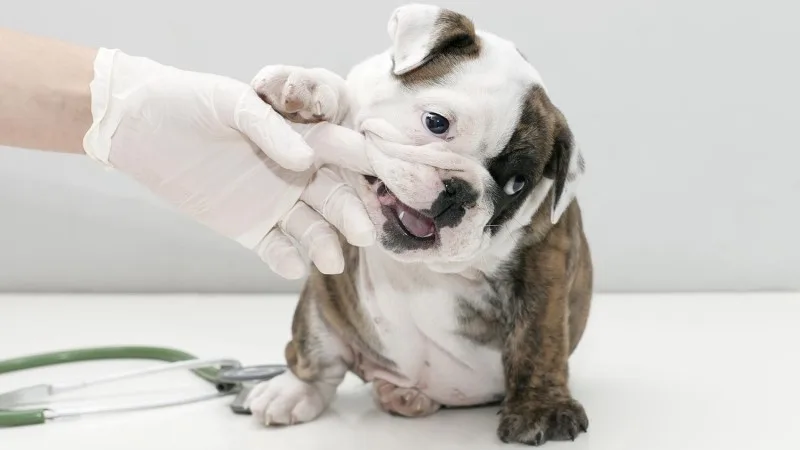
You’re a few days away from picking up your new puppy, and everyone is too excited to sleep. You have a new leash, collar, toys, and a crate, but what are you forgetting? Have you scheduled your puppy’s first vet visit yet?
It may seem early, but your puppy should head to the vet during the first week at their new home. It is your responsibility to keep your puppy in top shape, and your veterinarian can help establish the guidelines for success.
First Puppy Vet Visit
Finding the right vet.
One of the best ways to find a veterinarian is to ask friends, neighbors, or even someone you see walking their dog or at the dog park for a local vet recommendation. You can even use social media to ask neighbors where they take their pets.
Finding a clinic near home is convenient for picking up supplies or emergency visits. You can also call a few clinics and check their websites for vital information, such as hours, how they handle emergencies, services they offer, and other criteria that may be important to you. The American Animal Hospital Association’s hospital locator tool is another excellent resource for pet owners struggling to find the right vet in their area.
Some clinics allow you to fill out new client information forms online. Their website may provide information for new puppy owners about the paperwork required for their first vet visit. The recent vet shortage is causing some challenges for pet owners to find vets and nearby clinics, so do your research.
Make a Checklist for Your Pet's First Vet Visit
When you make your appointment, the customer service representative or vet technician will tell you what items to bring to the first vet visit. In general, veterinarians will need a copy of your puppy’s medical records and relevant paperwork from the breeder, shelter, or rescue organization. Also, bring any medications your puppy is on, as your breeder may recommend a flea or heartworm medication. It’s possible there are drug contraindications and what your puppy is taking may no longer be necessary.
Part of your checklist should include the following information:
Record of vaccinations from the breeder
Any medical records from the breeder
Brand of food you’re currently feeding
Record of dewormings
As you gear up for the trip, don't forget to prep your dog for travel, so the car ride to their first veterinary visit is a positive experience. For example, bring a comfortable blanket or their crate... and plenty of treats.
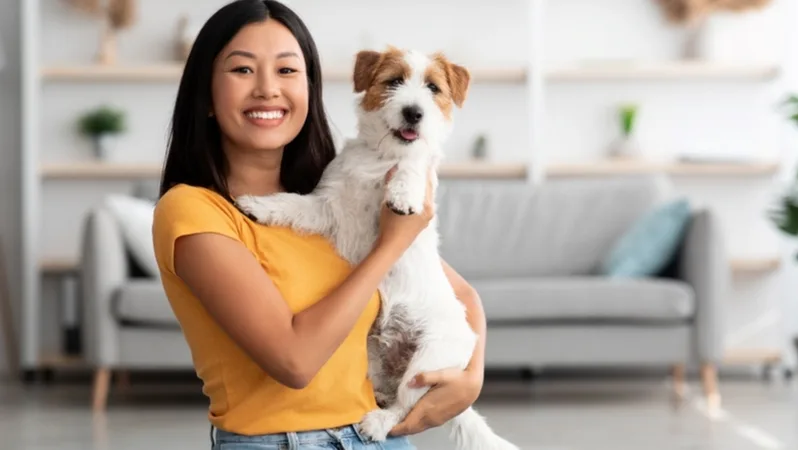
Every Dog and Cat Deserves the Pet Insurance of Champions
Get prize-winning care for your pets.
What Happens at a Puppy’s First Visit?
There are some standard procedures to expect during the first visit. A head-to-tail wellness exam will be done by the vet and vet technician. Your vet team will also use treats to ensure the experience is positive, as they want your puppy to enjoy being there.
The exam will include:
Taking the puppy's vital signs (temperature, heart rate, and respiratory rate), getting their weight, and discussing diet and general well-being (activity level, appetite, and any problems you may have experienced).
A comprehensive physical exam, including listening to the heart and lungs, palpating the abdomen, and conducting an oral exam.
The vet will also check your dog’s mouth, ears, eyes, nose, and toes, as well as the skin and coat. They will also recommend core vaccinations and deworming medications for future visits.
Questions to Ask Your Veterinary Team During the Head-to-Tail Exam
Your veterinarian is the best person to ask health-related questions about your new puppy. Their job is to ensure your dog is healthy, so keeping you informed about how to best care for your puppy is in their best interest!
Consider the following list of questions for your pet’s first vet visit:
Questions About Your Puppy’s Core Vaccines
What vaccines does my puppy need? Core vaccines include protection against diseases such as canine parvovirus, canine distemper, hepatitis, parainfluenza, and rabies. Non-core vaccines such as Bordetella (kennel cough), Lyme disease, and canine flu vaccine recommendations will depend on risk factors such as boarding plans, exposure to dog parks, contact with ticks, and other considerations based on your geographic location.
When does my puppy need this series of vaccines? The first vaccination is given around 8 weeks, and booster shots are given every 3 to 4 weeks until about 20 weeks. It is a good idea for some miniature breed dogs to have their vaccines spaced out longer than larger dogs. Specific recommendations will depend on the age and size of your dog.
Are there possible side effects resulting from the vaccinations? For example, if there is any swelling at the vaccination site or your dog has an allergic reaction, you must return to the vet immediately.
What Are the General Care Recommendations for a New Puppy?
There are several important things every dog owner should know how to do, even if you plan on taking your pet to the groomer. Your vet will be happy to answer questions about:
Dental care and oral hygiene advice, including best methods for canine tooth brushing , appropriate chew, dental toys, and supplements, and the teething process
Best methods for cleaning dog ears and trimming toenails
Best age for a spay/neuter
Recommendations for microchipping
Possible health issues based on breed
Grooming tips
For answers to many of these questions, read Top 8 New Puppy Questions.
What Will the Vet Visit Cost?
This first visit should kick off the annual exams that occur throughout your dog’s lifetime. The average cost of veterinary care for your puppy during their first year ranges from $100 to $500 . It includes the core vaccinations they’ll need, like canine parvovirus, canine hepatitis, and rabies.
You can save a few dollars on office fees by taking advantage of the AKC Veterinary Network Certificate Program . This program provides newly AKC registered puppies and dogs with a certificate for a complimentary first veterinary office visit when taken to veterinarians in their network.
Learn more about the costs of veterinary care in the first year here .
Puppy insurance is also a great way to reduce financial stress brought on by vet visits. Everyone wants their dog to be the picture of good health, but accidents and illnesses can occur even with the best care. Even diseases like canine parvovirus can be both life-threatening and expensive to treat, with care costing thousands of dollars in some cases.
Another thing for puppy owners to keep in mind is that most pet insurance companies exclude pre-existing conditions, denying coverage for injuries or illnesses that occur before a policy. AKC Pet Insurance (underwritten by Independence American Insurance Company) is the ONLY brand that offers pre-existing condition coverage after a 12-month waiting period*. Click here for a quote and create a custom plan that fits your pet and your budget.
*Not available in all states. “Only brand“ refers to comparison with 5 pet insurance carriers making up approximately 80% of the US pet insurance market (Nationwide, ASPCA, Trupanion, HealthyPaws and PetPlan).
Schedule Future Visits Before You Leave the Vet's Office
Don’t forget to schedule future visits for puppy shots before you leave the vet's office, as most vaccinations require boosters to be effective. Vaccines are generally necessary every 3 to 4 weeks until 20 weeks. Keeping your dog on a regular exam schedule for preventive healthcare is key to a long and healthy life!
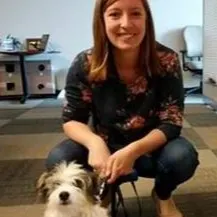
Mary comes to AKC Pet Insurance with an extensive background in animal care. As a lifelong animal lover, she has a passion for promoting pet health and wellness. Mary lives in Kentucky with her orange kitty, "Cat" and her dog, " Wubbi".
Related Articles
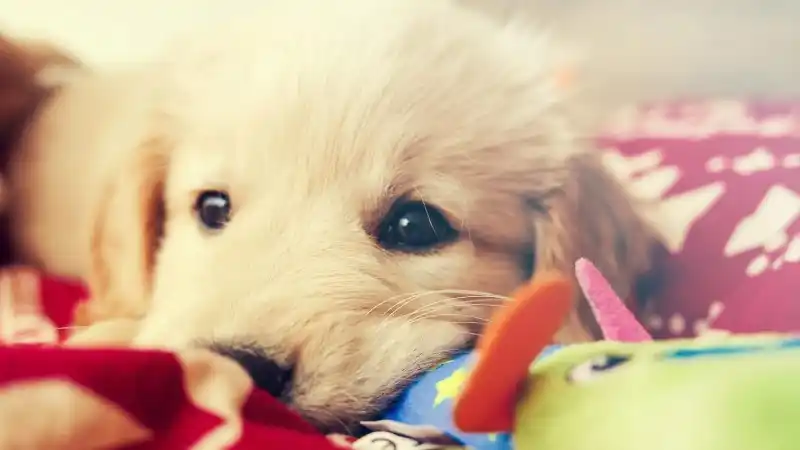
Top 8 Questions When Getting a New Puppy
Discover answers to commonly asked questions about bringing home a new puppy, things you need for a puppy, puppy care, puppy diet, and much more!

Recipes for Dog Birthday Cakes & Treats
Discover dog birthday cake recipes to celebrate your pup's special day. Bake a cake or try out our other DIY recipes for amazing dog birthday treats.
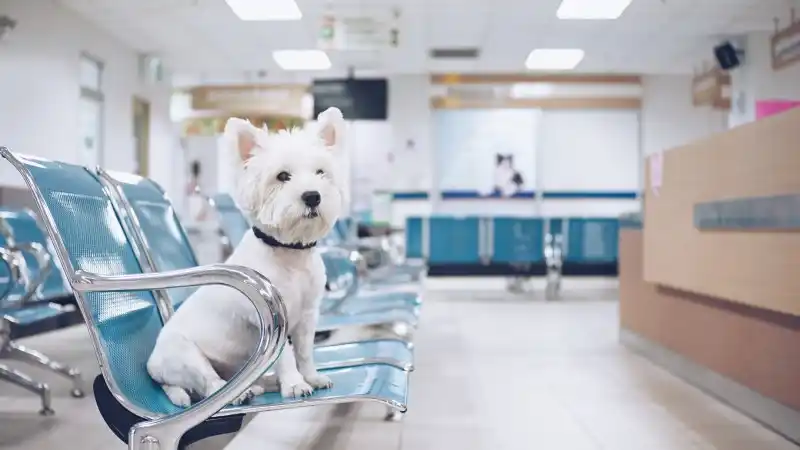
9 Questions to Ask During Your Puppy's First Vet Visit
Are you prepared for your puppy's first vet visit? Here are 9 questions to ask pertaining to care, vaccination, diet, pet insurance, and socialization.
- Our Hospital
- Why Trust Us?
- Wellness Plan Benefits
- Medium Dogs
- Vaccinations & Prevention
- Routine Exams
- Internal Medicine
- Emergency Care
- Dental Care
- Senior Pet Care
- Puppies & Kittens
- Exotic Pets
- In-House Lab
- Pet Care Tips
- Financing Options
OPEN 7 DAYS A WEEK WITH SATURDAY & SUNDAY APPOINTMENTS
- 357 South Avenue E Westfield NJ 07090 US
- (908) 233-6030
- Emergencies
Puppy’s First Vet Visit: Checklist & What to Expect
You brought home a new puppy, and it's such an exciting time, but what should you do to keep them happy and healthy? Here, our vets in Westfield offer a checklist of what to bring to your puppy's first vet visit, along with what to expect and questions to ask.
What happens during my new puppy's first vet checkup?
If you have a new puppy that needs their first vet checkup, you may wonder what this visit will entail. During your puppy's first visit and exam , the vet will:
- Weigh your puppy.
- Listen to their heart and lungs.
- Take your puppy's temperature.
- Examine the eyes, ears, nose, feet, and genitalia.
- Take a look at your puppy's skin and coat.
- Look at your puppy's teeth and mouth.
- Palpate the abdomen and lymph nodes.
- Examine the feces for the presence of worms (the vet may ask you to bring a stool sample).
- Discuss your puppy's health history and any questions you might have about feeding, medical issues, and future care.
If you are going home with medications or treatments, you must understand when and how to give them. Follow directions exactly and set up a schedule for follow-up visits and vaccinations.
Your Puppy's First Vet Visit: Checklist
You should bring certain things to the veterinary appointment. Generally, the more information you provide, the better your vet can treat your pup.
- Record from the breed or shelter
- A list of questions or concerns that you have
- Notes on how much of what types of foods and treats you offer at home
- A dog carrier or crate lined with some old towels or shirts that smell like home
- Leash and collar or harness
- A chew toy to keep them busy
- Small treats to reward good behavior
- Any forms requested by our vets at the time of booking your visit
- A stool sample, as fresh as possible
You won't be able to walk into the vet office carrying your new puppy. Puppies can be very wiggly. You should control them using a leash, collar, or harness. You can bring your dog in a crate if he is small enough.
What to Ask the Vet on a Puppy's First Visit
Your vet plays an important role in keeping your puppy healthy. Don't hesitate to ask questions if you need further information or clarification.
Preparing a list of questions in advance might help you make the most of your first visit. Here are some examples of questions for your vet during your puppy's visit.
Keeping Your Puppy Safe & Healthy
- How often does my puppy need to come to the vet?
- When should I spay or neuter my puppy?
- Should I microchip my puppy?
- How often should my puppy poop?
- Are any health concerns specific to my puppy's breed(s)?
- Does my puppy need flea and tick prevention?
- What is heartworm disease, and why is prevention important?
Training Your New Puppy
- When can my puppy go to the pet store/dog park/groomer?
- Is crate training recommended?
- How long can she stay in her crate?
- What is the easiest way to potty train a puppy?
- How much exercise does my puppy need?
- How do I socialize my puppy with other humans and dogs?
- Do you know any local trainers?
Feeding Your New Puppy
- What kind of food should my puppy eat?
- How many times a day should my puppy eat?
- When do puppies switch to adult dog food?
- Are there any foods that I shouldn't give my puppy?
Cost of Your Puppy's First Vet Visit
Factors such as the clinic's location, vaccine types, and prescribed medications can affect the cost of your puppy's first vet visit.
Going to vaccination clinics can save you money. However, it is recommended that you contact the veterinarian directly for a more accurate estimate of costs. This way, you can avoid any unpleasant surprises.
Note: The advice provided in this post is intended for informational purposes and does not constitute medical advice regarding pets. For an accurate diagnosis of your pet's condition, please make an appointment with your vet.
Does your new furry friend need a veterinary checkup and preventive care? Contact our vets at Westfield Animal Hospital today to book an appointment.

Now Welcoming New Patients
Looking for a vet in Westfield? Our vets at Westfield Animal Hospital are now accepting new patients! Our friendly and welcoming vets love providing cats, dogs, and exotic pets with high-quality veterinary care. Contact us today to schedule an appointment.
Contact (908) 233-6030 Open Menu Close Menu
- Our Hospital
- Why Trust Us?
- Vaccinations & Prevention
- Routine Exams
- Internal Medicine
- Dental Care
- Geriatric Care
- Puppies & Kittens
- Emergency Care
- Avian & Exotics
- Chiropractic Therapies
- Diagnostics & Lab
- New Patient Form
- Tips & Advice
- Financing Options
(608) 754-1888
(608) 423-3555
(608) 362-1515
- Client Center
Puppy’s First Vet Visit: Checklist & What to Expect
With a new puppy comes great responsibility. You will need to love it and ensure that you do everything you can to keep them healthy. Here, our vets in Southern Wisconsin share a checklist of what to bring to your puppy's first vet visit, along with what to expect and questions to ask.
What happens during my new puppy's first vet checkup?
If you have a new puppy that is in need of their first vet checkup, you may wonder what this visit will entail. During your puppy's first visit and exam , the vet will:
- Weigh your puppy.
- Listen to their heart and lungs.
- Take your puppy's temperature.
- Examine the eyes, ears, nose, feet, and genitalia.
- Take a look at your puppy's skin and coat.
- Look at your puppy's teeth and mouth.
- Palpate the abdomen and lymph nodes.
- Examine the feces for the presence of worms (the vet may ask you to bring a stool sample).
- Discuss your puppy's health history and any questions you might have about feeding, medical issues, and future care.
If you are going home with medications or treatments, you will need to understand when and how to give them. Follow directions exactly and set up a schedule for follow-up visits and vaccinations.
Your Puppy's First Vet Visit: Checklist of What to Bring
There are certain things that you should bring with you to your puppy's first vet visit. Generally, the more information you provide, the better your vet can treat your pup.
- Record from the breed or shelter
- A list of questions or concerns that you have
- Notes on how much of what types of foods and treats you offer at home
- A dog carrier or crate lined with some old towels or shirts that smell like home
- Leash and collar or harness
- A chew toy to keep them busy
- Small treats to reward good behavior
- Any forms requested by our vets at the time of booking your visit
- A stool sample, as fresh as possible
If you're planning a trip to the clinic for your puppy's first visit, don't expect to be able to carry them in your arms. Puppies can be very wiggly. You should control them using a leash, collar, or harness. You can also bring your dog in a crate if he is small enough.
What to Ask the Vet on a Puppy's First Visit
Your vet will be integral to keeping your puppy healthy throughout their life. Don't hesitate to ask questions if you ever need further information or clarification.
To make the most of your first visit, preparing a list of questions in advance might be helpful. Here are some examples of questions for your vet during your puppy's visit.
How to Keep Your Puppy Safe & Healthy
- How often does my puppy need to come to the vet?
- When should I spay or neuter my puppy?
- Should I microchip my puppy?
- How often should my puppy poop?
- Are any health concerns specific to my puppy's breed(s)?
- Does my puppy need flea and tick prevention?
- What is heartworm disease, and why is prevention important?
Training Your New Puppy
- When can my puppy go to the pet store/dog park/groomer?
- Is crate training recommended?
- How long can she stay in her crate?
- What is the easiest way to potty train a puppy?
- How much exercise does my puppy need?
- How do I socialize my puppy with other humans and dogs?
- Do you know any local trainers?
What You Should Feed Your Puppy
- What kind of food should my puppy eat?
- How many times a day should my puppy eat?
- When do puppies switch to adult dog food?
- Are there any foods that I shouldn't give my puppy?
Cost of Your Puppy's First Vet Visit
The cost of your puppy's first vet visit can be affected by factors such as the clinic's location, the types of vaccines administered, and any prescribed medications.
Going to vaccination clinics can save you money. However, it is recommended that you contact the veterinarian directly for a more accurate estimate of costs. This way, you can avoid any unpleasant surprises.
Note: The advice provided in this post is intended for informational purposes and does not constitute medical advice regarding pets. For an accurate diagnosis of your pet's condition, please make an appointment with your vet.
Is it time to schedule your new furry friend for their first veterinary checkup? Contact our vets at Badger Veterinary Hospital today to book an appointment.
New patients welcome.
Badger Veterinary Hospital is accepting new patients. Our team is passionate about the health of animals from across Southern Wisconsin. Contact our closest location to book your first appointment today!
Contact Open Menu Close Menu
6 editor-approved Amazon bestsellers for fall — from $10
- Share this —

- Watch Full Episodes
- Read With Jenna
- Inspirational
- Relationships
- TODAY Table
- Newsletters
- Start TODAY
- Shop TODAY Awards
- Citi Concert Series
- Listen All Day
Follow today
More Brands
- On The Show
- TODAY Plaza
Four killed in shooting at Georgia high school; 14-year-old suspect is in custody
Two students and two teachers were killed and nine others wounded Wednesday in a school shooting an hour outside of Atlanta, authorities said.
One suspect, a 14-year-old student, was alive and taken into custody following the gunfire at Apalachee High School, Georgia Bureau of Investigation director Chris Hosey said at a news conference late Wednesday afternoon.
The suspect surrendered to law enforcement immediately after being confronted, Hosey said. He will be charged with murder and will be handled as an adult, Hosey said.
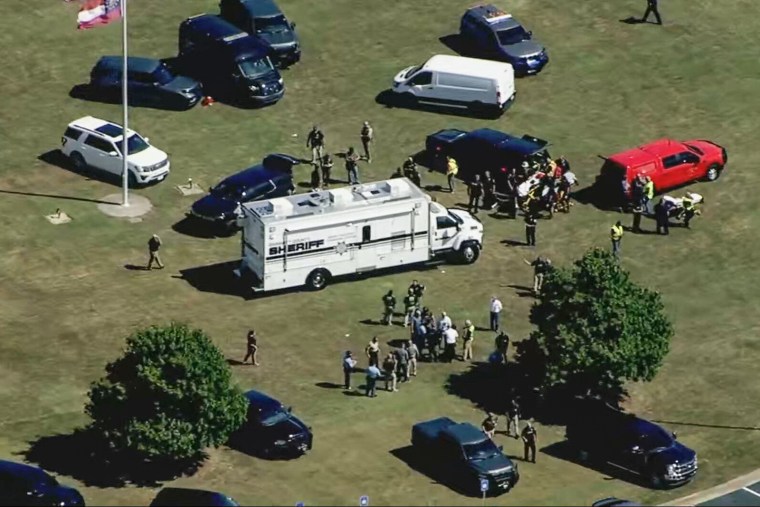
Barrow County Sheriff Jud Smith lamented the “pure evil” and “hateful event” that occurred at the school.
Earlier, he said it would take “multiple days” to determine what happened. “Every minute, it’s developing on what we’re finding,” he said.
Smith said authorities were working to reunite students with their parents.
The first call reporting an “active shooter” came in around 10:30 a.m., Smith said. Hosey said law enforcement officers and two school resource officers responded to the scene within minutes of being alerted to the shooting.
All campuses of Barrow County Schools, based in Winder, Georgia, went into a “soft lockdown” with most of the activity centered around Apalachee H.S. where police cars, fire trucks and ambulances had all converged.
Students could be seen being directed to the school’s football stadium.
“I have directed all available state resources to respond to the incident at Apalachee High School and urge all Georgians to join my family in praying for the safety of those in our classrooms, both in Barrow County and across the state,” Gov. Brian Kemp said in statement .
President Joe Biden said he was mourning those who were killed, as he pushed Congress to pass gun safety legislation.
“What should have been a joyous back-to-school season in Winder, Georgia, has now turned into another horrific reminder of how gun violence continues to tear our communities apart,” Biden said in a statement.

“Students across the country are learning how to duck and cover instead of how to read and write,” he added. “We cannot continue to accept this as normal.”
U.S. Attorney General Merrick Garland said he was “devastated” for the affected families and said the Justice Department was ready to provide support.
Grady Memorial Hospital in Atlanta confirmed that it was treating one gunshot victim.
School has been in session at Apalachee H.S. since Aug. 1 .
The school is Barrow County’s second high school, according to its website, and opened in 2000.
FBI agents from Atlanta were dispatched to the scene to assist local authorities, officials said .
David K. Li is a breaking news reporter for NBC News.
Tom Winter is a New York-based correspondent covering crime, courts, terrorism and financial fraud on the East Coast for the NBC News Investigative Unit.
Jonathan Dienst is a reporter for WNBC-TV in New York, leading its investigative reporting team and covering justice and law enforcement issues.
Melissa Chan is a reporter for NBC News Digital with a focus on gun violence.

Olympic gold medalist Hezly Rivera does incredible flip to throw the first pitch at the Rangers game

Two students, two teachers killed in shooting at Georgia high school; 14-year-old charged as an adult

Ina Garten opens up about childhood abuse, thought her father would 'kill' her

How to talk to children about shootings: An age-by-age guide

8 key questions for the 2024 NFL season

American athlete, 19, lays out plan to win 3 gold medals at next Paralympics: 'Mainfesting it'

‘Bachelorette’ Jenn Tran and Devin Strader broke up after engagement. What happened?

Chase Bank issues warning over ATM ‘glitch’ going viral on social media

Caitlin Clark is in her first season in the WNBA. How to watch her next game

Suspect identified by police in shooting death of 21-year-old gymnast Kara Welsh
Zelenskyy says Ukraine plans to indefinitely hold Russian territory it has seized
KYIV, Ukraine — Ukrainian President Volodymyr Zelenskyy told NBC News on Tuesday that Kyiv is planning to indefinitely hold Russian territories it seized in a surprise incursion last month as it tries to force President Vladimir Putin to the negotiating table.
“We don’t need their land. We don’t want to bring our Ukrainian way of life there,” he said during his first one-on-one interview since Ukraine’s high-stakes incursion into Russia.
Ukraine will “hold” the territory as it is integral to his “victory plan” to end the the war, Zelenskyy said, adding he will present the proposal to international partners like the United States.
“For now, we need it,” he said of the territory Ukraine is now holding in Russia.
Nearly a month ago, Ukrainian troops swept into Russia’s Kursk region in a secret operation that has challenged the status quo of the two-and-a-half-year-old war. Kyiv now claims it controls nearly 500 square miles of Russian territory and has taken hundreds of Russian prisoners of war.
The Aug. 6 incursion was “a pre-emptive strike” to stop the Russians from creating a buffer zone along Ukraine’s border, Zelenskyy said. With Kyiv intensifying its attacks on Russian border regions, Putin has vowed to take Ukrainian border territory to stop the assaults.
Zelenskyy said he couldn't discuss whether Ukraine planned to try to seize more Russian territory.

“I will not tell, I’m sorry,” he said. “With all respect, I can’t speak about it. I think the success is very close to surprise.”
Zelenskyy also told NBC News that the Biden administration was not aware of plans to cross over into Russia ahead of time as it was a closely guarded secret even inside Ukraine.
Washington has repeatedly said it was not in on Kyiv’s plans for Kursk.
“Yes, we did not inform anyone. And it’s not the question of lack of trust,” Zelenskyy said, adding that Kyiv’s counteroffensive last summer failed in many ways because of how much it was advertised and talked about, which gave Russians a chance to prepare.
This time, even Ukrainian intelligence services did not know, he said.
“I shrunk to the maximum the circle of people who knew about this operation,” Zelenskyy added. “I think it was one of the reasons why it was successful.”

The Kremlin has tried to maintain a semblance of control in the face of the incursion, saying Kyiv's forces are suffering from unusually heavy losses. So far, though, Russia has failed to push the Ukrainians out of its territory .
Despite what is widely seen as Ukraine's success in Russia, it continues to lose ground in its east, where the Kremlin's forces are inching closer to taking the key logistics hub of Pokrovsk and neighboring Toretsk in the Donetsk region.
One of the goals of the incursion, Zelenskyy said, was to force Moscow to pull troops from across the 600-mile front line in Ukraine, in particular in the east. And while he said Russia has diverted 60,000 troops to Kursk from Ukraine, Pokrovsk has not seen a big drop.
NBC News could not verify this number.
On Monday, Putin said his forces in the east have been advancing faster than they have done for a long time.
So now, more than 30 months since his invasion, Moscow still controls about a fifth of Ukraine's territory, having illegally annexed large portions of it. Ukrainian cities and villages get bombarded nearly daily, with the latest strike on the central city of Poltava on Tuesday claiming at least 51 lives.
With war fatigue growing amid Ukraine's struggle to recruit enough manpower to sustain the war, talk of peace negotiations has grown.
But Ukraine has insisted it only wants to take part in them from a position of power, which holding Russian territory could help give it. A second peace summit is expected to be held in November — the first was in Switzerland in June — and Zelenskyy told NBC News that representatives from Russia have to be present.
“We understand that without the Russian side, ending this war diplomatically is very difficult,” he said.
Multiple Russian officials have already said peace negotiations were impossible after Ukraine's invasion of Kursk.
Richard Engel and Gabe Joselow reported from Kyiv, and Yuliya Talmazan from London.
NBC News Chief Foreign Correspondent
Gabe Joselow is a producer at NBC News.
Yuliya Talmazan is a reporter for NBC News Digital, based in London.

COMMENTS
Find out how to prepare for your puppy's first vet visit. Learn more about what to expect during your appointment and what to discuss with your vet.
Your puppy's first vet visit is critical and sets the tone for future interactions with your veterinarian. Use our nine tips to prepare.
11 Questions to Ask at Your First Vet Visit If you recently brought a new dog home, you should have a vet visit scheduled. If this is your first time at a veterinarian, you might not know where to start. It can be an anxious time for you and your dog, but it is an important step in starting off on the right foot.
Discover the essential questions to ask during your pet's first veterinary visit, including vaccination schedules, diet recommendations, and seasonal health tips. Ensure your pet's long-term well-being with our expert guide tailored for new pet owners.
Key Takeaways: The first vet visit for your puppy is crucial for their overall health and well-being, including vaccinations, preventive treatments, and a comprehensive physical examination. Establishing a positive bond with the veterinarian during the first visit helps reduce stress for future visits and builds trust.
If you're getting ready for your puppy's first vet visit, this vet approved checklist and preparation tips will come in handy. Learn what you need to do beforehand and be prepared to ask your vet ...
The very first visit to the veterinary clinic should not be clinical at all, but rather a fun introduction to a new place. When scheduling your first visit, tell the receptionist that you want to introduce your dog to the veterinary clinic before his medical appointment. ... A veterinary technician will accompany you into the exam room and ask ...
Bringing your pet to the veterinary hospital can be overwhelming. Keep reading to learn about the top 10 questions you should ask a vet at your next visit!
The first visit to the vet can be nerve-wracking both for you and your pet. It's only natural for them to be nervous. Your furry friend doesn't understand the point of a veterinary visit. But you can ease this stress significantly by helping them prepare for that first vet visit. Taking care of your pet while they're scared can become quite a task. Fortunately, we have six things you can ...
Are you prepared for your puppy's first vet visit? Here are 9 questions to ask pertaining to care, vaccination, diet, pet insurance, and socialization.
Learn what to expect at your new pet's first vet visit, what information to bring, beneficial questions to ask, and more tips for a stress-free trip.
If you're taking your pet to a veterinarian for the time, you need to read these good questions to make sure you get the help you need.
There's a lot you can do to help your pet's first veterinarian visit run smoothly and get the most out of your time there. Bring your adoption papers from the shelter. This will help your veterinarian get to know your pet's medical history, and which vaccines they've already had, or still need. Bring a list of any medications or ...
Your puppy's first vet visit shouldn't feel stressful. Here's a puppy checklist of everything you need to bring and what to know ahead of time.
A puppy's first vet visit can be a walk in the park when you prepare. Here's what you can expect at vet visits for puppies and what to bring.
The first veterinary visit is an important step to making sure your kitten is healthy now and in the future. Find out what you can expect.
Learn more about what to expect at your puppy's first vet visit. Read about questions to ask the vet to lead your pup to good health and wellness success.
Puppy's First Vet Visit: Checklist & What to Expect You brought home a new puppy, and it's such an exciting time, but what should you do to keep them happy and healthy? Here, our vets in Westfield offer a checklist of what to bring to your puppy's first vet visit, along with what to expect and questions to ask.
Our vets in Southern Wisconsin share a checklist for what to bring to your puppy's first vet visit, along with what to expect and questions to ask.
A Puppy's First Vet Visit: Questions to Ask Being a first-time puppy parent can be a little overwhelming at first, and you may have so many questions that you don't know where to start. If this is the case, here are a few questions to guide your conversation with your veterinarian. At what age should I switch from puppy to adult food?
Hezly Rivera waves to the crowd before throwing out the ceremonial first pitch before the start of the game between the Texas Rangers and the New York Yankees at Globe Life Field on Sept. 4, 2024 ...
For an optimal experience visit our site on another browser. ... The first call reporting an "active shooter" came in around 10:30 a.m., Smith said. ... 8 key questions for the 2024 NFL season.
Zelenskyy said he couldn't discuss whether Ukraine planned to try to seize more Russian territory. Ukraine's military released video on Aug. 7 that it says shows the surrender of Russian troops ...